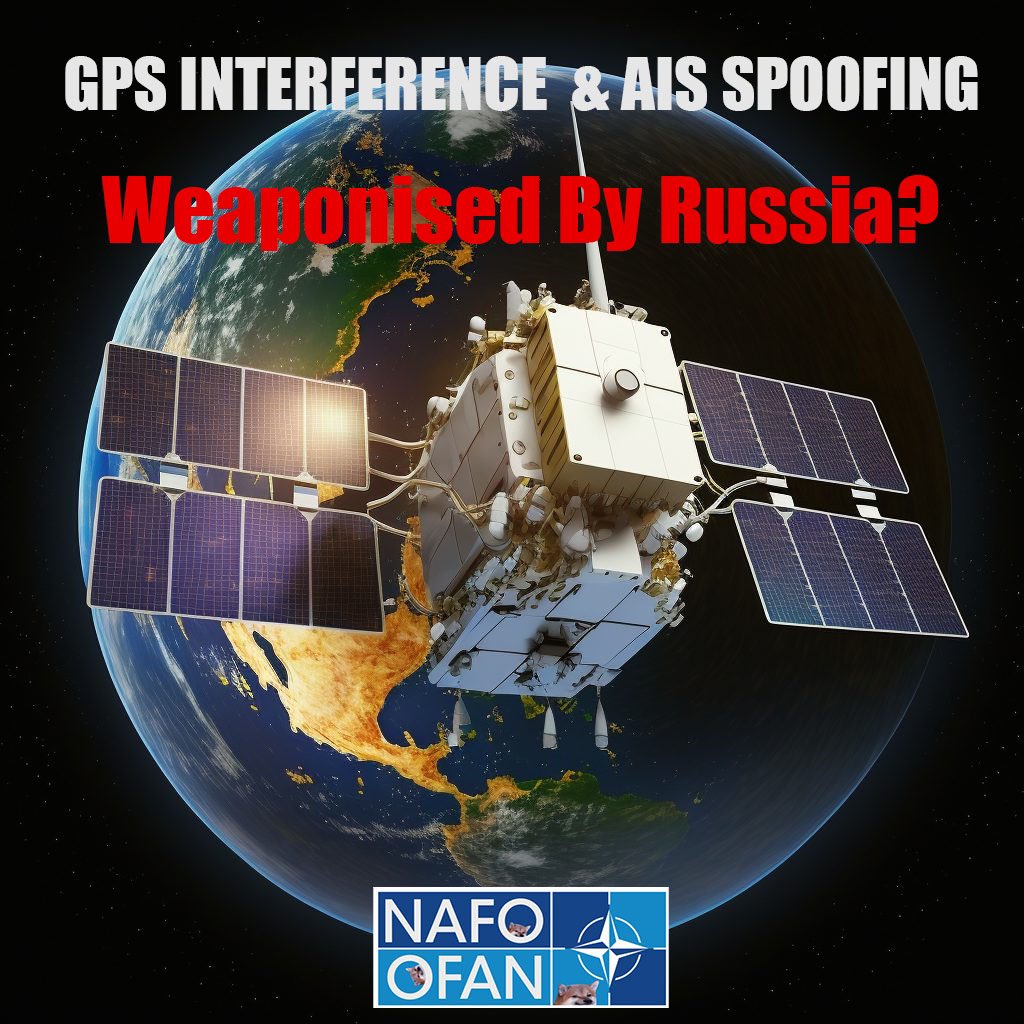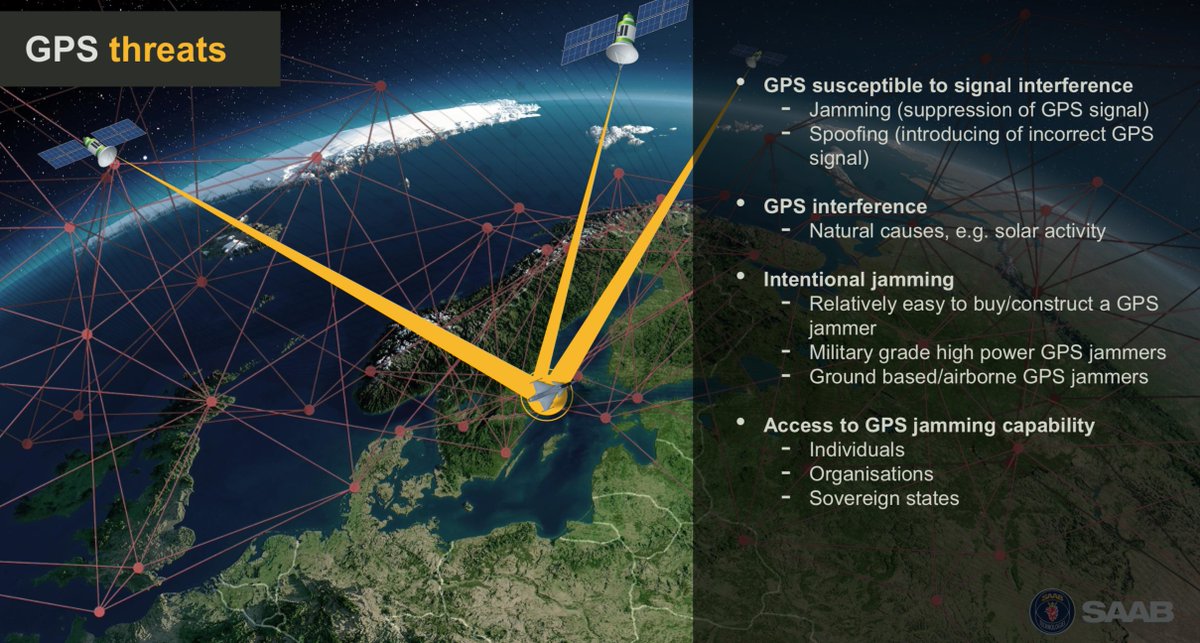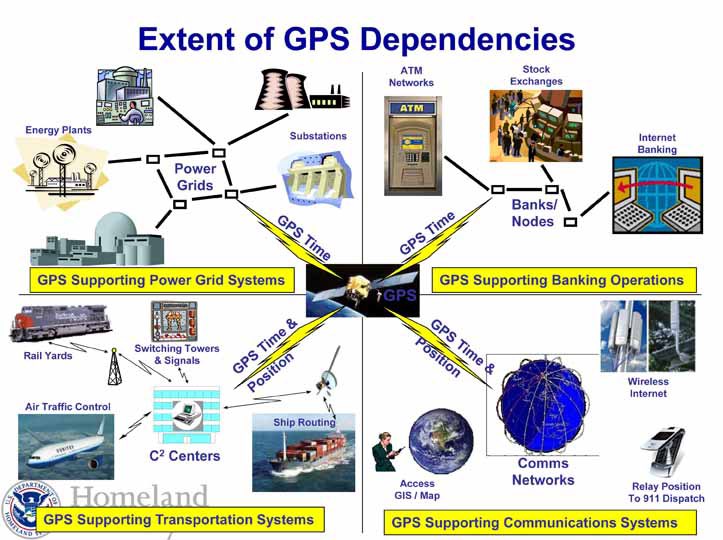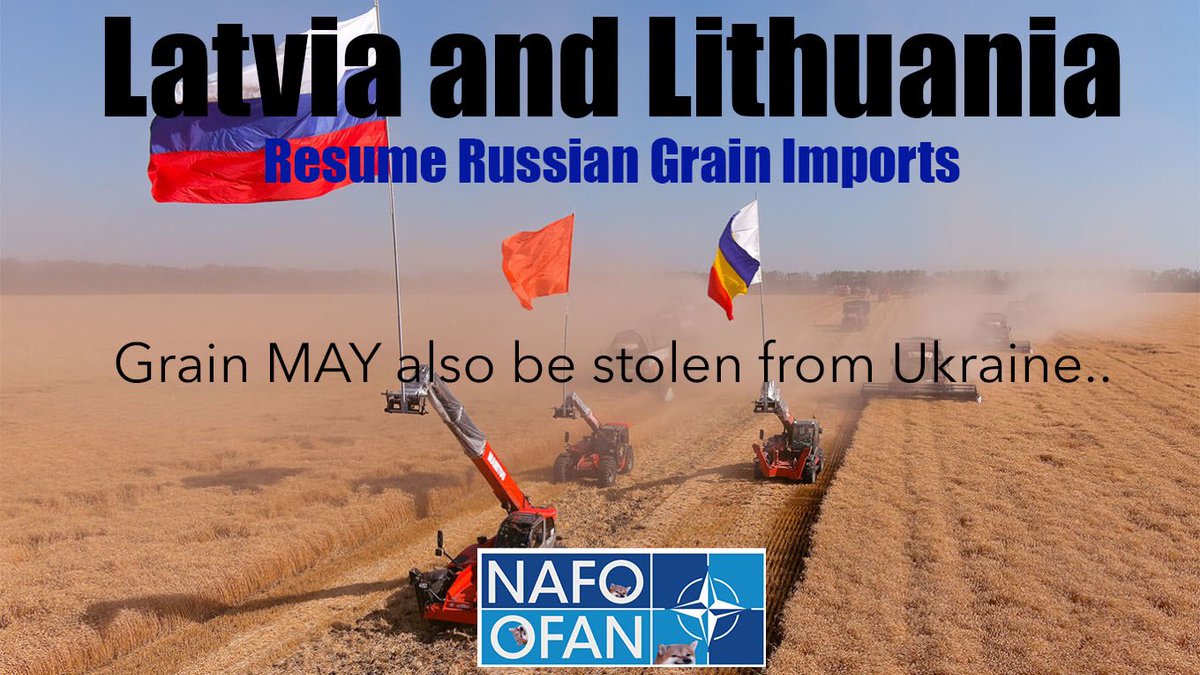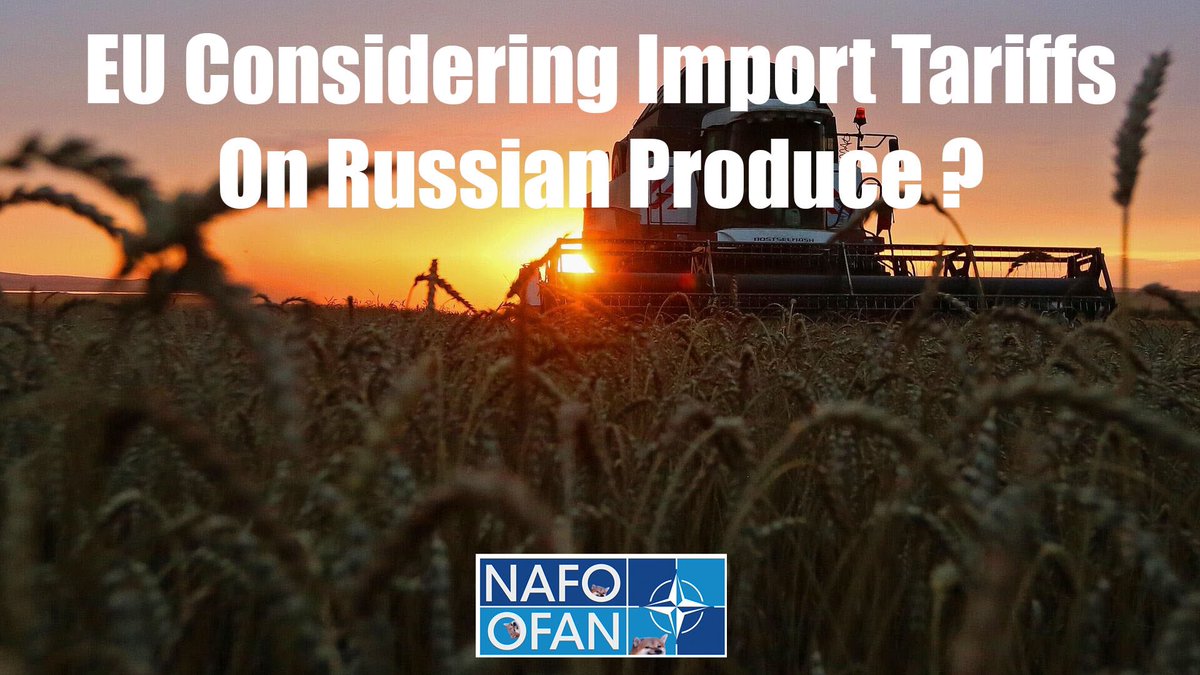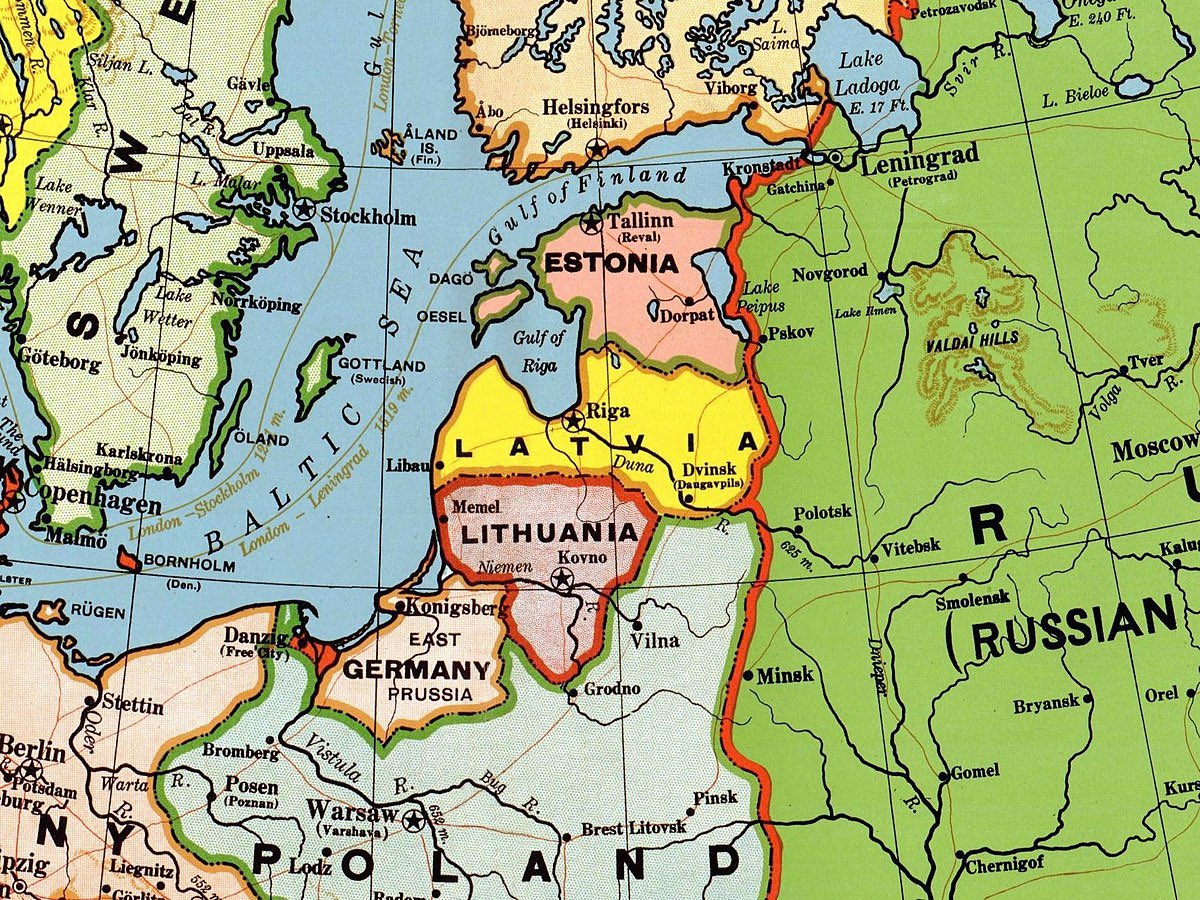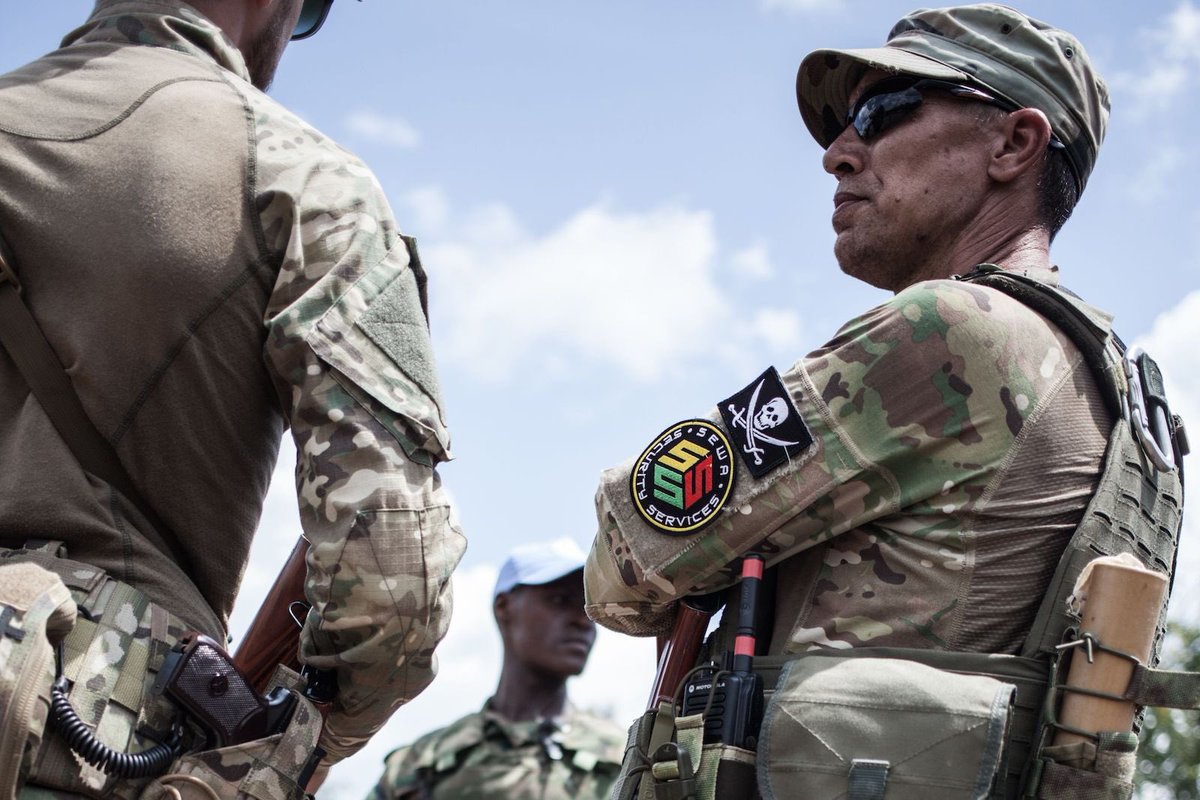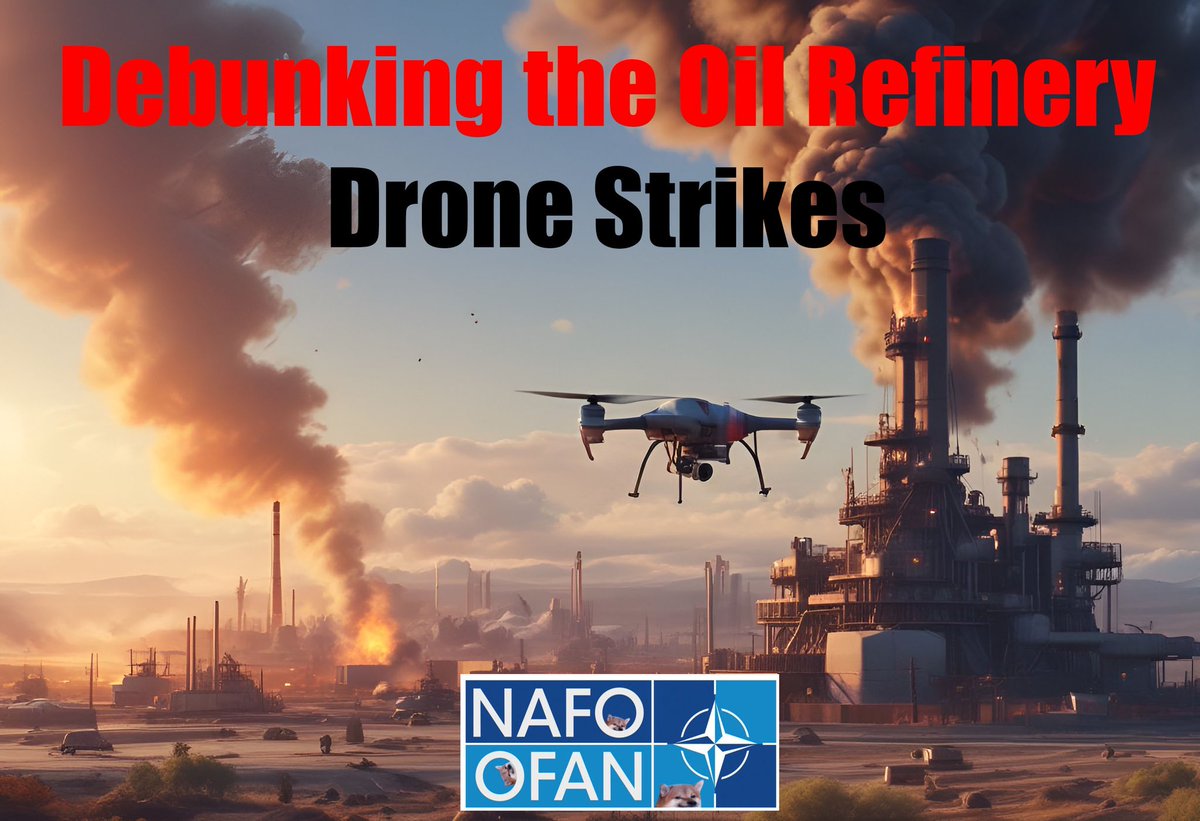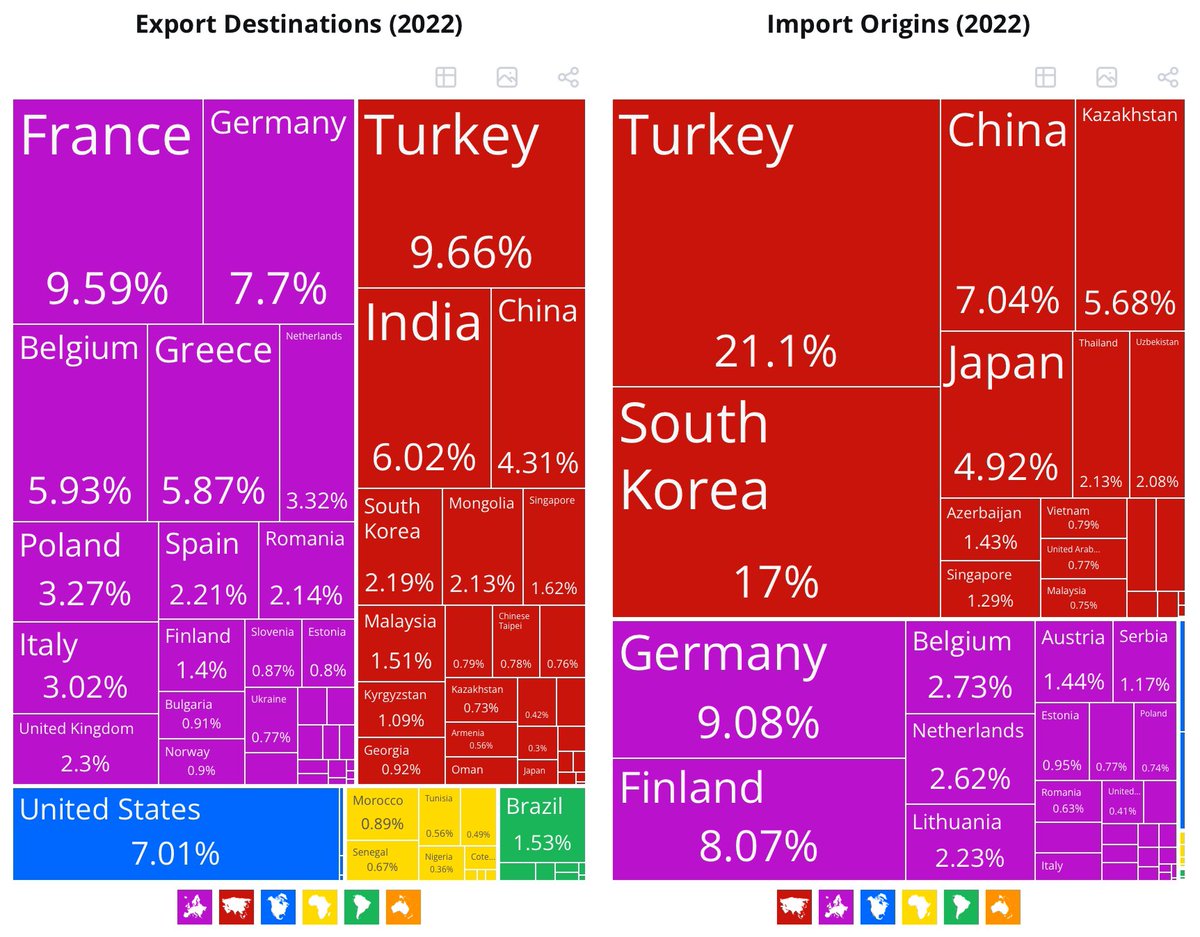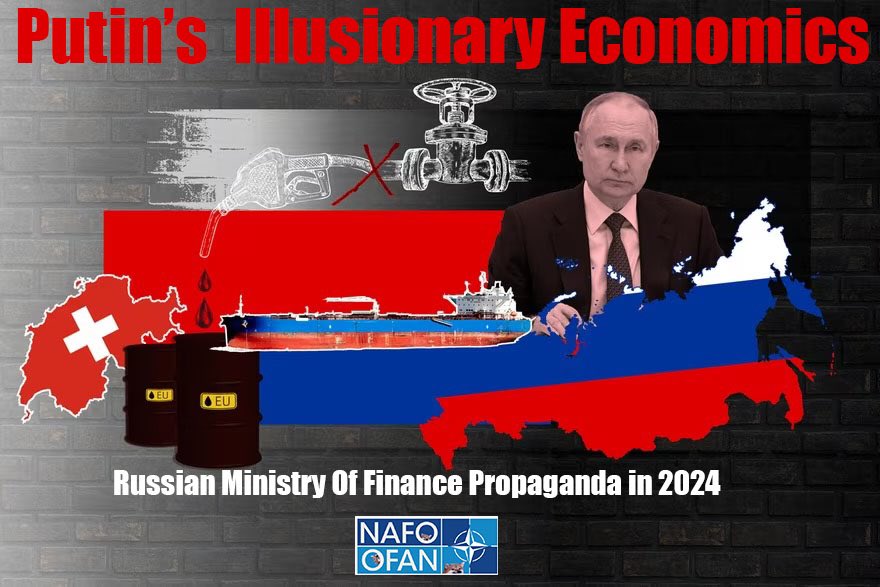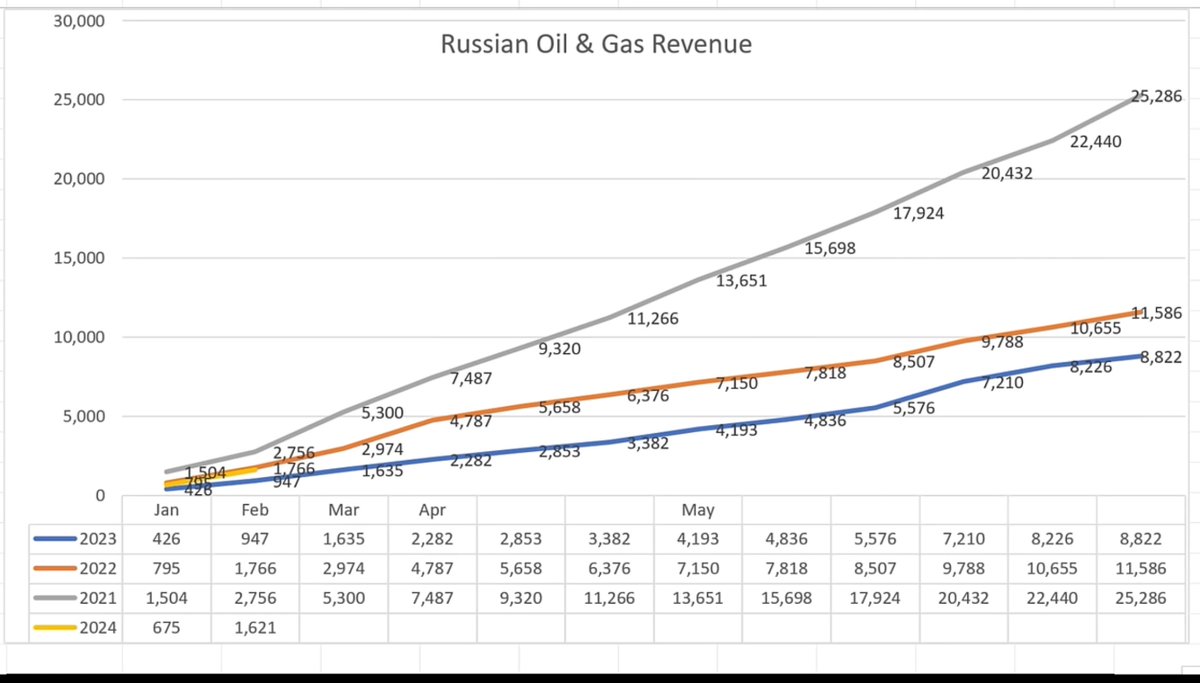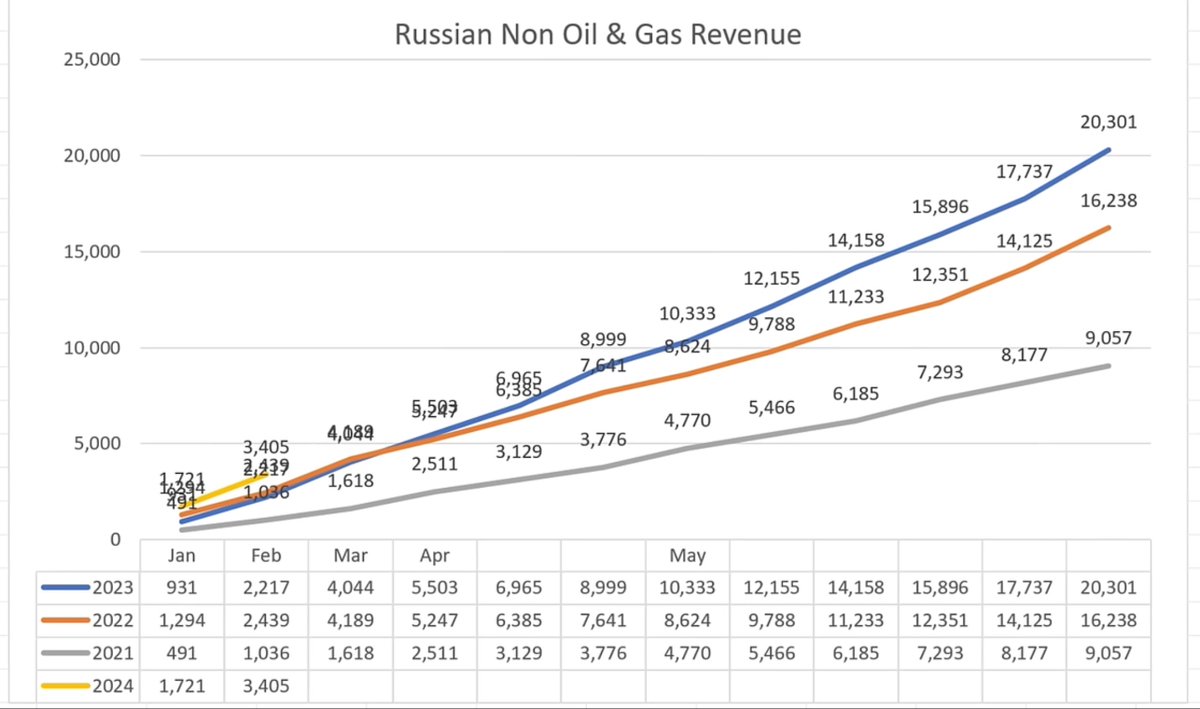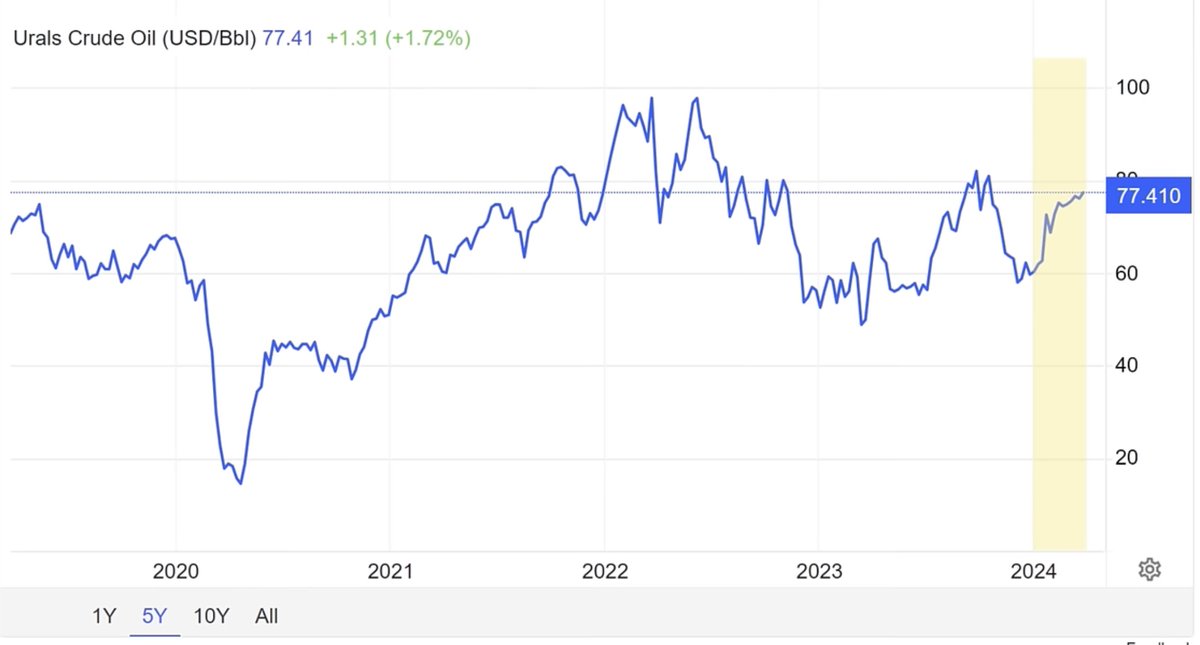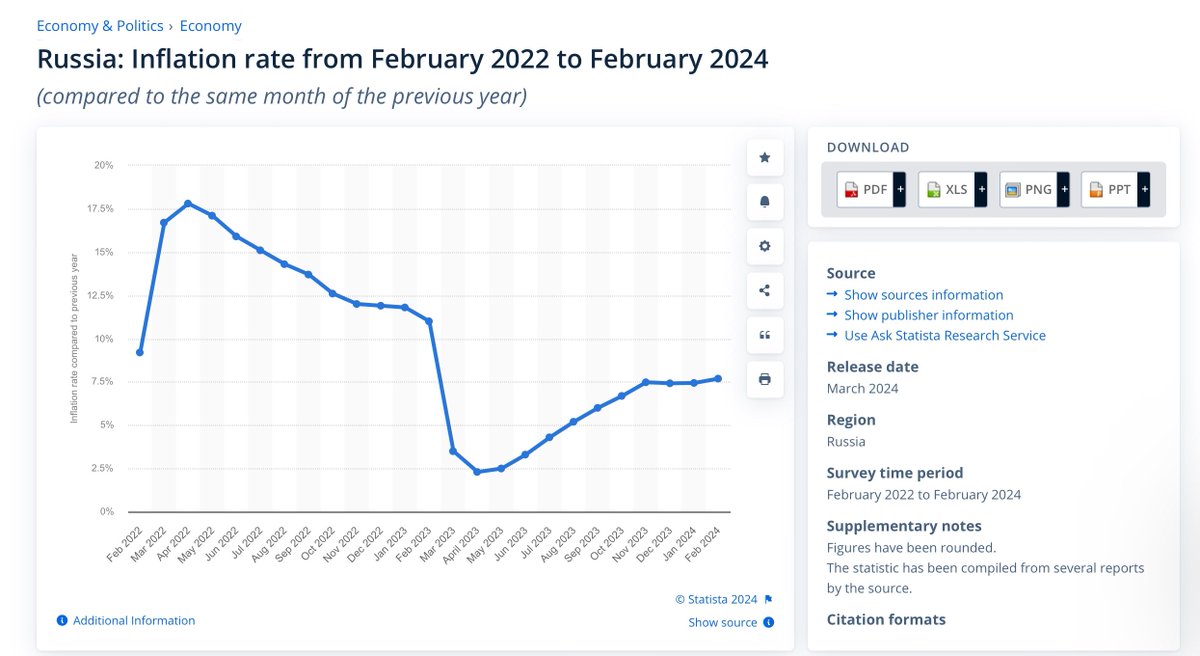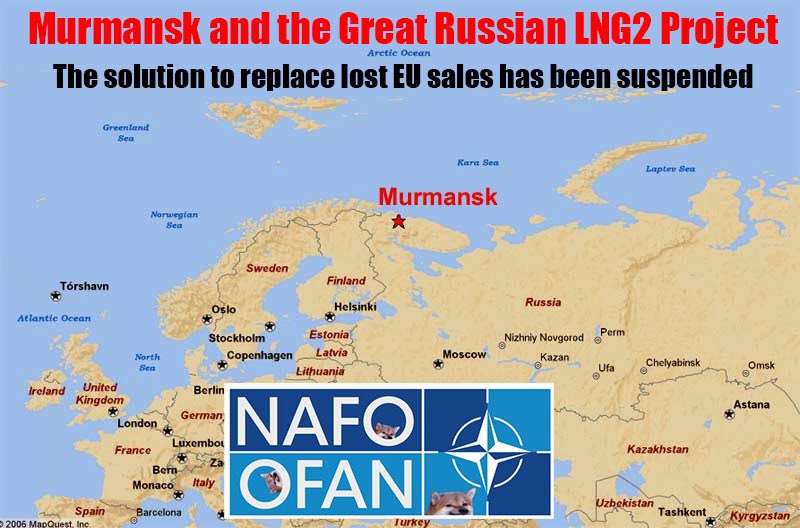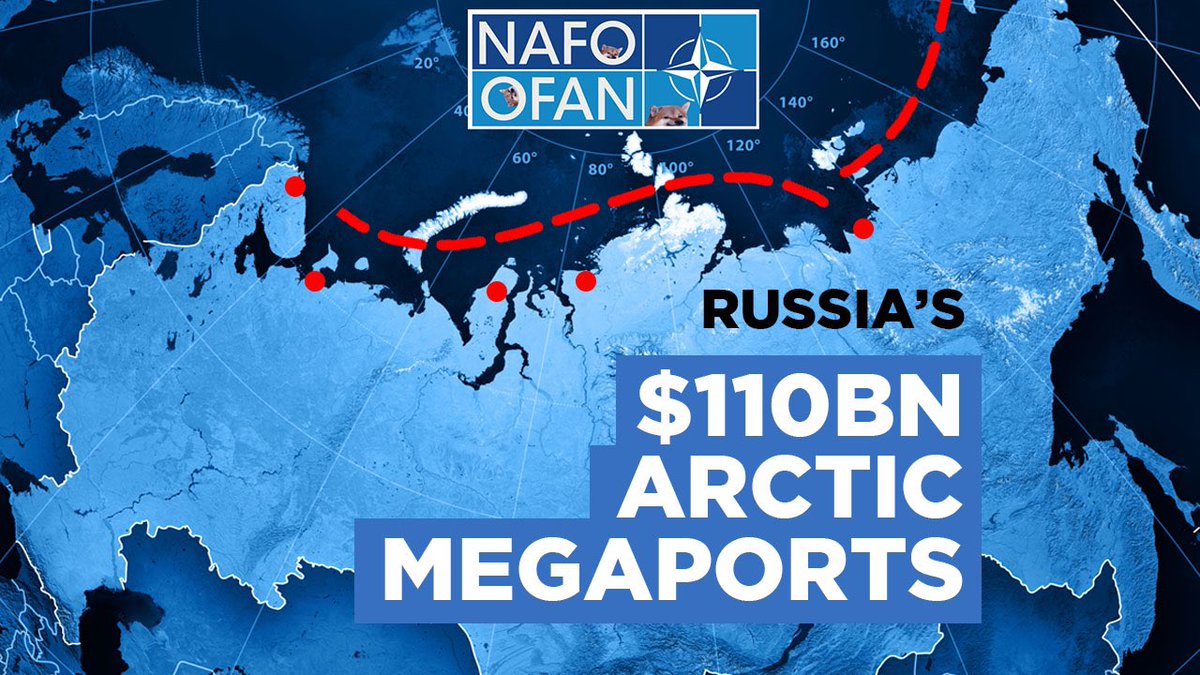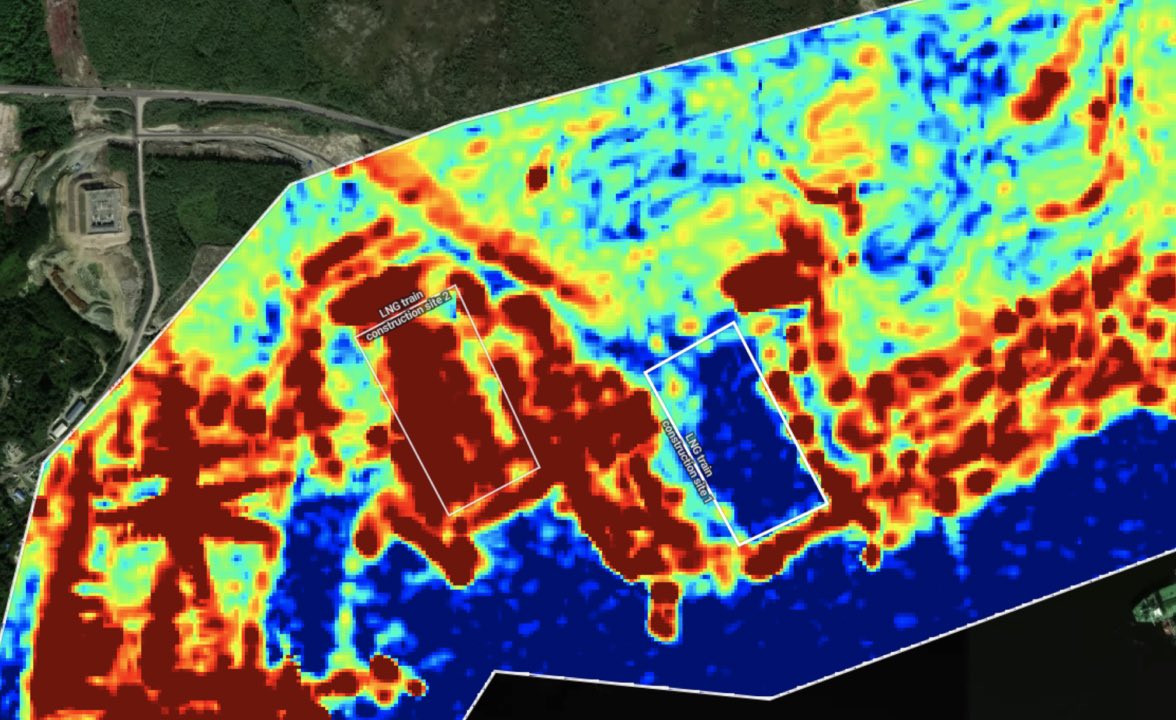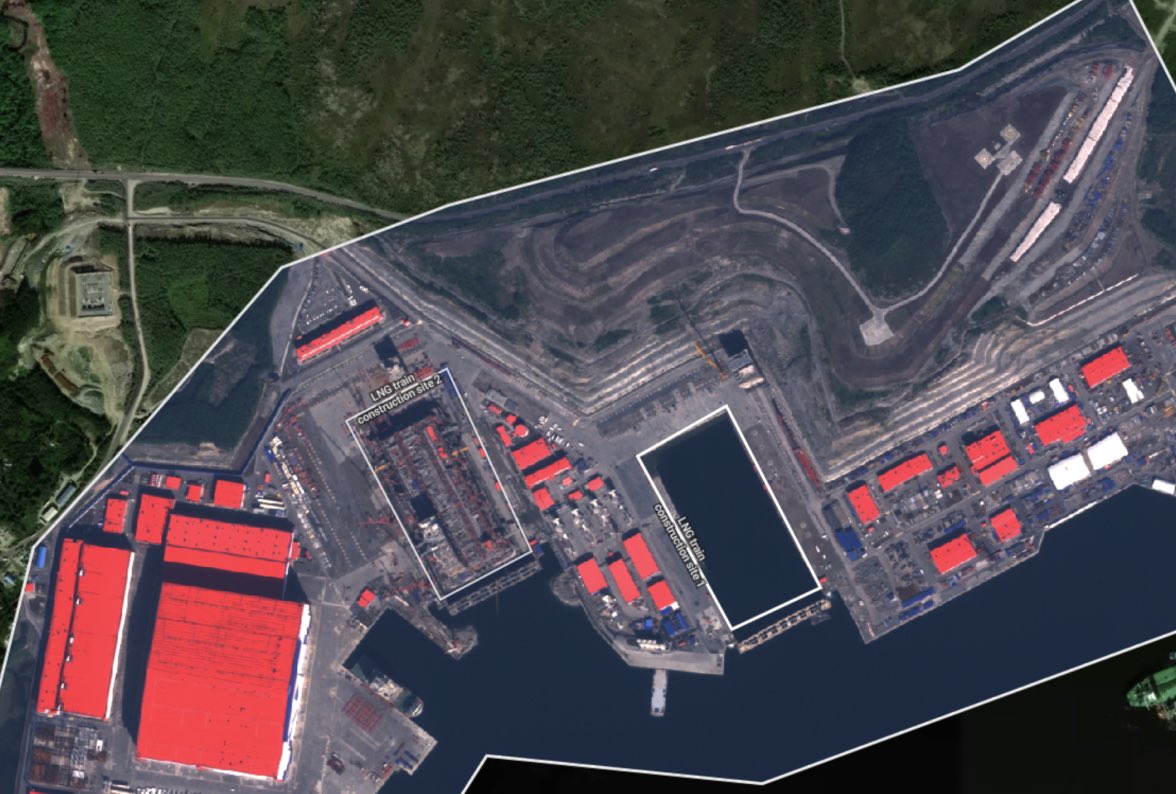A detailed thread setting out the new OFAC sanctions published 01 May 2024:
Intro:
U.S. Continues to Degrade Russia’s Military-Industrial Base and Target Third-Country Support with Nearly 300 New Sanctions
Per the FT and OFAC press statements today:
The targets of the sanctions announced on Wednesday include two Chinese groups that provided Moscow with nitrocellulose, an ingredient for gunpowder and rocket propellant, as well as Russian importers of the chemicals.
The Chinese targets include groups that allegedly supplied Russia with drones, weapons and ammunition, in addition to chips, sensors and other military-related technology.
The Treasury placed sanctions on two Chinese groups — Wuhan Global Sensor Technology and Wuhan Tongsheng Technology — that officials recently told reporters were helping Russia. Wuhan Global produced infrared detectors for a Russian manufacturer of military optics.
It also targeted Juhang Aviation, a Shenzhen-based company that produces drone-related equipment, including propellers, signal jammers, sensors and engines.
The US also designated shipping operators that have continued to support the development of Russia’s Arctic LNG 2 project after it was sanctioned last year. Among them is Red Box Energy Services, a Singapore-based company founded by US-born shipping executive Philip Adkins.
The journey of Red Box-operated vessels, the Audax and Pugnax, through the ice-bound Northern Sea Route to deliver equipment to Arctic LNG 2 was documented in a Financial Times investigation in February. Adkins has not been designated by the US. He did not immediately respond to a request for comment.
The US Department of State said: “Today’s actions demonstrate the United States’ continued resolve to constrain the Arctic LNG 2 project’s production and export capacity and limit third-party support to the project.” The US has sought other ways to curb cash flows to Vladimir Putin’s regime, including a measure that passed the Senate on Tuesday to ban imports of enriched uranium from Russia.
The White House has indicated it supports the move. The bill will also release $2.7bn in government funding to build domestic uranium processing within the US. Almost a fifth of the nuclear fuel used by the US nuclear reactor fleet is supplied through enrichment contracts with Russian suppliers, which is estimated to be worth about $1bn a year.
The legislation contains temporary waivers until the start of 2028, during which US customers can continue importing Russian uranium if no alternative supplies are available.
1/12
Intro:
U.S. Continues to Degrade Russia’s Military-Industrial Base and Target Third-Country Support with Nearly 300 New Sanctions
Per the FT and OFAC press statements today:
The targets of the sanctions announced on Wednesday include two Chinese groups that provided Moscow with nitrocellulose, an ingredient for gunpowder and rocket propellant, as well as Russian importers of the chemicals.
The Chinese targets include groups that allegedly supplied Russia with drones, weapons and ammunition, in addition to chips, sensors and other military-related technology.
The Treasury placed sanctions on two Chinese groups — Wuhan Global Sensor Technology and Wuhan Tongsheng Technology — that officials recently told reporters were helping Russia. Wuhan Global produced infrared detectors for a Russian manufacturer of military optics.
It also targeted Juhang Aviation, a Shenzhen-based company that produces drone-related equipment, including propellers, signal jammers, sensors and engines.
The US also designated shipping operators that have continued to support the development of Russia’s Arctic LNG 2 project after it was sanctioned last year. Among them is Red Box Energy Services, a Singapore-based company founded by US-born shipping executive Philip Adkins.
The journey of Red Box-operated vessels, the Audax and Pugnax, through the ice-bound Northern Sea Route to deliver equipment to Arctic LNG 2 was documented in a Financial Times investigation in February. Adkins has not been designated by the US. He did not immediately respond to a request for comment.
The US Department of State said: “Today’s actions demonstrate the United States’ continued resolve to constrain the Arctic LNG 2 project’s production and export capacity and limit third-party support to the project.” The US has sought other ways to curb cash flows to Vladimir Putin’s regime, including a measure that passed the Senate on Tuesday to ban imports of enriched uranium from Russia.
The White House has indicated it supports the move. The bill will also release $2.7bn in government funding to build domestic uranium processing within the US. Almost a fifth of the nuclear fuel used by the US nuclear reactor fleet is supplied through enrichment contracts with Russian suppliers, which is estimated to be worth about $1bn a year.
The legislation contains temporary waivers until the start of 2028, during which US customers can continue importing Russian uranium if no alternative supplies are available.
1/12
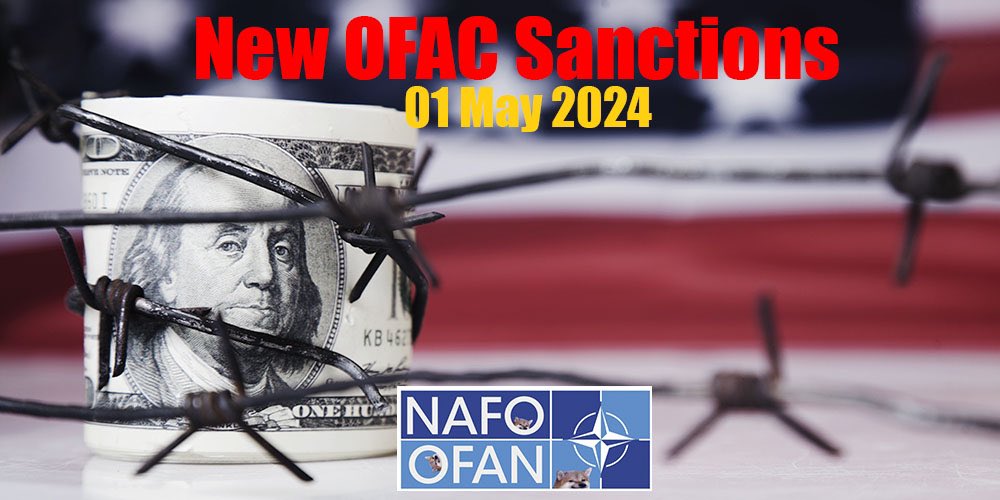
Today, (01 may 2024), the Department of the Treasury is taking action to further degrade Russia’s ability to sustain its war machine, continuing a multilateral campaign to limit the Kremlin’s revenue and access to the materiel it needs to prosecute its illegal war against Ukraine.
Today’s actions target Russia’s military-industrial base and chemical and biological weapons programs as well as companies and individuals in third countries that help Russia acquire key inputs for weapons or defense-related production.
The United States, along with many international partners, is particularly concerned about entities based in the People’s Republic of China (PRC) and other third countries that provide critical inputs to Russia’s military-industrial base.
This support enables Russia to continue its war against Ukraine and poses a significant threat to international security. The almost 300 targets being sanctioned by both Treasury and the Department of State include sanctions on dozens of actors that have enabled Russia to acquire desperately needed technology and equipment from abroad.
“Treasury has consistently warned that companies will face significant consequences for providing material support for Russia’s war, and the U.S. is imposing them today on almost 300 targets,” said Secretary of the Treasury Janet L. Yellen.
“Today’s actions will further disrupt and degrade Russia’s war efforts by going after its military industrial base and the evasion networks that help supply it. Even as we’re throwing sand in the gears of Russia’s war machine, President Biden’s recently-passed National Security Supplemental is providing badly-needed military, economic, and humanitarian support to bolster Ukraine’s courageous resistance. Combined, our support for Ukraine and our relentless targeting of Russia’s military capacity is giving Ukraine a critical leg-up on the battlefield.”
In addition to the nearly 200 targets sanctioned by the Department of the Treasury, the Department of State is imposing sanctions on over 80 entities and individuals that are engaged in sanctions evasion and circumvention or are related to Russia’s chemical and biological weapons programs and defense industrial base.
The Department of State is also targeting Russia’s revenue generation through its future energy, metals, and mining production and sanctioning additional individuals in connection with the death of opposition leader and anticorruption activist Aleksey Navalny. For more information on State actions, see the Department of State Fact Sheet.
The U.S. Department of Justice also filed a forfeiture complaint today against a set of aircraft landing gear for a Boeing 737-800 that was detained in September 2023 at Miami International Airport by U.S. Customs and Border Patrol.
The gear was purchased for $1.55 million for the benefit of a Kyrgyz Republic-based transhipper of dual-use items servicing the Russian Federation, in violation of U.S. sanctions on LLC RM Design and Development, which was designated by OFAC in July 2022.
👉 SANCTIONS EVASION, CIRCUMVENTION, AND BACKFILL
Treasury is committed to disrupting individuals and entities who help facilitate Russia’s acquisition of technology and equipment for its war machine.
Treasury and other U.S. government partners have issued extensive guidance and conducted outreach around the world to educate and inform about the risks of doing business with Russia, and Treasury will continue to take unilateral action when necessary to disrupt Russia’s military-industrial supply chains, no matter where they are located.
Today’s action includes nearly 60 targets located in Azerbaijan, Belgium, the PRC, Russia, Slovakia, Türkiye, and the United Arab Emirates (UAE), that enable Russia to acquire desperately-needed technology and equipment from abroad.
2/12
Today’s actions target Russia’s military-industrial base and chemical and biological weapons programs as well as companies and individuals in third countries that help Russia acquire key inputs for weapons or defense-related production.
The United States, along with many international partners, is particularly concerned about entities based in the People’s Republic of China (PRC) and other third countries that provide critical inputs to Russia’s military-industrial base.
This support enables Russia to continue its war against Ukraine and poses a significant threat to international security. The almost 300 targets being sanctioned by both Treasury and the Department of State include sanctions on dozens of actors that have enabled Russia to acquire desperately needed technology and equipment from abroad.
“Treasury has consistently warned that companies will face significant consequences for providing material support for Russia’s war, and the U.S. is imposing them today on almost 300 targets,” said Secretary of the Treasury Janet L. Yellen.
“Today’s actions will further disrupt and degrade Russia’s war efforts by going after its military industrial base and the evasion networks that help supply it. Even as we’re throwing sand in the gears of Russia’s war machine, President Biden’s recently-passed National Security Supplemental is providing badly-needed military, economic, and humanitarian support to bolster Ukraine’s courageous resistance. Combined, our support for Ukraine and our relentless targeting of Russia’s military capacity is giving Ukraine a critical leg-up on the battlefield.”
In addition to the nearly 200 targets sanctioned by the Department of the Treasury, the Department of State is imposing sanctions on over 80 entities and individuals that are engaged in sanctions evasion and circumvention or are related to Russia’s chemical and biological weapons programs and defense industrial base.
The Department of State is also targeting Russia’s revenue generation through its future energy, metals, and mining production and sanctioning additional individuals in connection with the death of opposition leader and anticorruption activist Aleksey Navalny. For more information on State actions, see the Department of State Fact Sheet.
The U.S. Department of Justice also filed a forfeiture complaint today against a set of aircraft landing gear for a Boeing 737-800 that was detained in September 2023 at Miami International Airport by U.S. Customs and Border Patrol.
The gear was purchased for $1.55 million for the benefit of a Kyrgyz Republic-based transhipper of dual-use items servicing the Russian Federation, in violation of U.S. sanctions on LLC RM Design and Development, which was designated by OFAC in July 2022.
👉 SANCTIONS EVASION, CIRCUMVENTION, AND BACKFILL
Treasury is committed to disrupting individuals and entities who help facilitate Russia’s acquisition of technology and equipment for its war machine.
Treasury and other U.S. government partners have issued extensive guidance and conducted outreach around the world to educate and inform about the risks of doing business with Russia, and Treasury will continue to take unilateral action when necessary to disrupt Russia’s military-industrial supply chains, no matter where they are located.
Today’s action includes nearly 60 targets located in Azerbaijan, Belgium, the PRC, Russia, Slovakia, Türkiye, and the United Arab Emirates (UAE), that enable Russia to acquire desperately-needed technology and equipment from abroad.
2/12
👉 RUSSIA’S MILITARY-INDUSTRIAL BASE
Russia’s military-industrial base relies on a vast ecosystem of entities that enable and support the production, maintenance, transportation, and sustainment of materiel used by Russia’s military. Today’s action takes aim at more than 100 entities operating or that have operated in the technology, defense and related materiel, manufacturing, or transportation sectors of the Russian Federation economy.
For more information on these targets, please see Annex 2.
Foreign financial institutions that conduct or facilitate significant transactions, or provide any service, involving Russia’s military-industrial base—including any person designated pursuant to E.O. 14024 for operating or having operated in the technology, defense and related materiel, construction, aerospace, or manufacturing sectors of the Russian Federation economy—run the risk of being sanctioned by OFAC. Russia’s military-industrial base may also include individuals and entities that support the sale, supply, or transfer of certain items or classes of items.
OFAC has issued Guidance for Foreign Financial Institutions on OFAC Sanctions Authorities Targeting Support to Russia’s Military-Industrial Base.
👉 RUSSIA’S ACQUISITION OF EXPLOSIVES PRECURSORS
Russia relies on external suppliers for cotton cellulose and its highly flammable byproduct, nitrocellulose, which are key explosives precursors that Russia needs to keep producing gunpowder, rocket propellants, and other explosives.
Today’s action targets major Russian importers of cotton cellulose, nitrocellulose, and key inputs to nitrocellulose such as cotton pulp, as well as two PRC-based suppliers sending these substances to Russia.
👉 RUSSIA’S CHEMICAL AND BIOLOGICAL WEAPONS PROGRAM PROCUREMENT
Treasury is also targeting three Russia-based entities and two individuals involved in procuring items for military institutes involved in Russia’s chemical and biological weapons programs. In coordination, the Department of State is separately designating three Russian government entities associated with Russia’s chemical and biological weapons programs and four Russian companies contributing to such entities.
These actions are being taken concurrent with the Department of State’s imposition of Chemical and Biological Weapons Control and Warfare Elimination Act of 1991 (the CBW Act) sanctions on Russia over its use of the chemical weapon chloropicrin against Ukrainian troops.
👉 EXPANSION OF RUSSIA’S NATURAL GAS INFRASTRUCTURE
Guided by commitments made in February by President Biden and G7 leaders to take steps to limit Russia’s future energy revenues and impede Russia’s development of future energy projects, today Treasury is targeting two Russia-based entities involved in natural gas-related construction projects, Neftegazstroy and Aktsionernoe Obshchestvo Vnipigazdobycha.
These entities were designated pursuant to E.O. 14024 for operating or having operated in the construction sector of the Russian Federation economy.
Russian Unmanned Aerial Vehicle Procurement Network
Tulun International Holding Limited (Tulun International) is a Hong Kong-based procurement intermediary that represented itself as the end-user of, but ultimately resold, Global Navigation Satellite Systems (GNSS) boards that were installed in Russian one-way attack unmanned aerial vehicles (UAVs) used by Russian military forces to attack Ukrainian targets, and shortly thereafter recovered in October and November 2023.
3/12
Russia’s military-industrial base relies on a vast ecosystem of entities that enable and support the production, maintenance, transportation, and sustainment of materiel used by Russia’s military. Today’s action takes aim at more than 100 entities operating or that have operated in the technology, defense and related materiel, manufacturing, or transportation sectors of the Russian Federation economy.
For more information on these targets, please see Annex 2.
Foreign financial institutions that conduct or facilitate significant transactions, or provide any service, involving Russia’s military-industrial base—including any person designated pursuant to E.O. 14024 for operating or having operated in the technology, defense and related materiel, construction, aerospace, or manufacturing sectors of the Russian Federation economy—run the risk of being sanctioned by OFAC. Russia’s military-industrial base may also include individuals and entities that support the sale, supply, or transfer of certain items or classes of items.
OFAC has issued Guidance for Foreign Financial Institutions on OFAC Sanctions Authorities Targeting Support to Russia’s Military-Industrial Base.
👉 RUSSIA’S ACQUISITION OF EXPLOSIVES PRECURSORS
Russia relies on external suppliers for cotton cellulose and its highly flammable byproduct, nitrocellulose, which are key explosives precursors that Russia needs to keep producing gunpowder, rocket propellants, and other explosives.
Today’s action targets major Russian importers of cotton cellulose, nitrocellulose, and key inputs to nitrocellulose such as cotton pulp, as well as two PRC-based suppliers sending these substances to Russia.
👉 RUSSIA’S CHEMICAL AND BIOLOGICAL WEAPONS PROGRAM PROCUREMENT
Treasury is also targeting three Russia-based entities and two individuals involved in procuring items for military institutes involved in Russia’s chemical and biological weapons programs. In coordination, the Department of State is separately designating three Russian government entities associated with Russia’s chemical and biological weapons programs and four Russian companies contributing to such entities.
These actions are being taken concurrent with the Department of State’s imposition of Chemical and Biological Weapons Control and Warfare Elimination Act of 1991 (the CBW Act) sanctions on Russia over its use of the chemical weapon chloropicrin against Ukrainian troops.
👉 EXPANSION OF RUSSIA’S NATURAL GAS INFRASTRUCTURE
Guided by commitments made in February by President Biden and G7 leaders to take steps to limit Russia’s future energy revenues and impede Russia’s development of future energy projects, today Treasury is targeting two Russia-based entities involved in natural gas-related construction projects, Neftegazstroy and Aktsionernoe Obshchestvo Vnipigazdobycha.
These entities were designated pursuant to E.O. 14024 for operating or having operated in the construction sector of the Russian Federation economy.
Russian Unmanned Aerial Vehicle Procurement Network
Tulun International Holding Limited (Tulun International) is a Hong Kong-based procurement intermediary that represented itself as the end-user of, but ultimately resold, Global Navigation Satellite Systems (GNSS) boards that were installed in Russian one-way attack unmanned aerial vehicles (UAVs) used by Russian military forces to attack Ukrainian targets, and shortly thereafter recovered in October and November 2023.
3/12
Russia-based Limited Liability Company Ultran Electronic Components (Ultran EK) procures microelectronics, including items that have been recovered from Orlan-10 UAVs used against Ukrainian forces.
Ultran EK imported 71 shipments of electronic integrated circuits into Russia between June 8, 2022 and September 26, 2023, including electronic integrated circuits with UAV applications such as field programmable gate arrays.
After Russia’s February 2022 full-scale invasion of Ukraine, Ultran EK began to rely on Hong Kong-based RG Solutions Limited (RG Solutions) for microelectronics. RG Solutions exported 104 shipments of electronic integrated circuits between January 1, 2023 and December 25, 2023, including electronic integrated circuits with UAV applications such as field programmable gate arrays.
RG Solutions engaged in wire transfer activity that indicated the trading of electronic components with military applications to Russia. RG Solutions engaged in payments referencing invoices, transport services, microcircuits, compressor spare parts, freight, and contracts.
Hong Kong-based Finder Technology Limited (Finder Technology) exported 293 shipments of electronic integrated circuits between January 3, 2023 and December 29, 2023, including electronic integrated circuits with UAV applications such as field programmable gate arrays.
Finder Technology acted as an intermediary for Russia-based Joint Stock Company Compel (Compel) and exported microelectronics to Compel, prior to and following its July 20, 2023 designation by the Department of the Treasury pursuant to E.O. 14024 for operating or having operated in the electronics sector of the Russian Federation economy.
PRC-based Juhang Aviation Technology Shenzhen Co, Ltd. (Juhang Aviation) exported 94 shipments of export-controlled items with UAV and other military applications, including items in Tier 1, Tier 2, and Tier 4 of the Department of Commerce Common High Priority List, to Russia-based TSK Vektor OOO (TSK Vektor) between August 5, 2022 and December 31, 2023. Items exported to TSK Vektor by Juhang Aviation included items for UAV production such as propellers, signal jammers, sensors, and UAV engines.
TSK Vektor was designated by the Department of the Treasury pursuant to E.O. 14024 on December 12, 2023, for providing material support to IEMZ Kupol, which produces one-way attack UAVs for the Russian Ministry of Defense and was designated by the U.S. Department of the Treasury pursuant to E.O. 14024 on December 12, 2023 for operating or having operated in the defense and related materiel sector of the Russian Federation economy.
Juhang Aviation has also exported dual-use items with UAV and other military applications, such as integrated circuits, to LLC Testkomplekt. LLC Testkomplekt was designated by the Department of the Treasury pursuant to E.O. 14024 on May 19, 2023 for operating or having operated in the electronics sector of the Russian Federation economy.
Tulun International, Ultran EK, RG Solutions, Finder Technology, and Juhang Aviation were designated pursuant to E.O. 14024 for operating or having operated in the defense and related materiel sector of the Russian Federation economy.
4/12
Ultran EK imported 71 shipments of electronic integrated circuits into Russia between June 8, 2022 and September 26, 2023, including electronic integrated circuits with UAV applications such as field programmable gate arrays.
After Russia’s February 2022 full-scale invasion of Ukraine, Ultran EK began to rely on Hong Kong-based RG Solutions Limited (RG Solutions) for microelectronics. RG Solutions exported 104 shipments of electronic integrated circuits between January 1, 2023 and December 25, 2023, including electronic integrated circuits with UAV applications such as field programmable gate arrays.
RG Solutions engaged in wire transfer activity that indicated the trading of electronic components with military applications to Russia. RG Solutions engaged in payments referencing invoices, transport services, microcircuits, compressor spare parts, freight, and contracts.
Hong Kong-based Finder Technology Limited (Finder Technology) exported 293 shipments of electronic integrated circuits between January 3, 2023 and December 29, 2023, including electronic integrated circuits with UAV applications such as field programmable gate arrays.
Finder Technology acted as an intermediary for Russia-based Joint Stock Company Compel (Compel) and exported microelectronics to Compel, prior to and following its July 20, 2023 designation by the Department of the Treasury pursuant to E.O. 14024 for operating or having operated in the electronics sector of the Russian Federation economy.
PRC-based Juhang Aviation Technology Shenzhen Co, Ltd. (Juhang Aviation) exported 94 shipments of export-controlled items with UAV and other military applications, including items in Tier 1, Tier 2, and Tier 4 of the Department of Commerce Common High Priority List, to Russia-based TSK Vektor OOO (TSK Vektor) between August 5, 2022 and December 31, 2023. Items exported to TSK Vektor by Juhang Aviation included items for UAV production such as propellers, signal jammers, sensors, and UAV engines.
TSK Vektor was designated by the Department of the Treasury pursuant to E.O. 14024 on December 12, 2023, for providing material support to IEMZ Kupol, which produces one-way attack UAVs for the Russian Ministry of Defense and was designated by the U.S. Department of the Treasury pursuant to E.O. 14024 on December 12, 2023 for operating or having operated in the defense and related materiel sector of the Russian Federation economy.
Juhang Aviation has also exported dual-use items with UAV and other military applications, such as integrated circuits, to LLC Testkomplekt. LLC Testkomplekt was designated by the Department of the Treasury pursuant to E.O. 14024 on May 19, 2023 for operating or having operated in the electronics sector of the Russian Federation economy.
Tulun International, Ultran EK, RG Solutions, Finder Technology, and Juhang Aviation were designated pursuant to E.O. 14024 for operating or having operated in the defense and related materiel sector of the Russian Federation economy.
4/12
👉 Radioavtomatika Procurement Network
The Treasury Department is also designating individuals and entities that are part of the procurement network of Russian defense procurement firm Radioavtomatika LLC (Radioavtomatika) and its front company, Novastream Limited (Novastream), to acquire foreign electronic components that are critical to Russia’s war effort.
Radioavtomatika was designated by the Department of State pursuant to E.O. 14024 on March 3, 2022 for operating or having operated in the defense and related materiel sector of the Russian Federation economy.
Since Radioavtomatika’s designation, it has sought to leverage a broad network of intermediaries to acquire foreign electronic components critical to Russia’s war effort, including through close coordination with its front company, Novastream. Novastream was designated by the Department of the Treasury pursuant to E.O. 14024 on September 30, 2022 for being owned or controlled by, or for having acted or purported to act for or on behalf of, directly or indirectly, Radioavtomatika.
Ivan Vladimirovich Seliverstov (Seliverstov) is a Russian businessman who has conducted business with sanctioned companies such as Radioavtomatika.
Seliverstov has used his two Russia-based companies, Militechtrade Limited Liability Company (Militechtrade) and Joint Stock Company Militech (JSC Militech) to procure imported microelectronics on behalf of Radioavtomatika.
In support of Radioavtomatika, Seliverstov has collaborated with other Russian defense procurement companies, including Alfa Limited Liability Company (Alfa LLC).
Seliverstov and Alfa LLC were designated pursuant to E.O. 14024 for having materially assisted, sponsored, or provided financial, material, or technological support for, or goods or services to or in support of, Radioavtomatika.
Militechtrade and JSC Militech were designated pursuant to E.O. 14024 for being owned or controlled by, or for having acted or purported to act for or on behalf of, directly or indirectly, Seliverstov.
Yegor Igoryevich Mozhayev (Mozhayev) is a Russian national who is employed by Radioavtomatika. Mozhayev handles Radioavtomatika’s relationships with multiple suppliers and intermediaries, as well as oversees the company’s efforts to acquire advanced electronic components through its global procurement network.
Mozhayev is also the owner and general director of Russia-based company Leda Limited Liability Company (Leda).
Mozhayev was designated pursuant to E.O. 14024 for having acted or purported to act for or on behalf of, directly or indirectly, Radioavtomatika. Leda was designated pursuant to E.O. 14024 for being owned or controlled by, or for having acted or purported to act for or on behalf of, directly or indirectly, Mozhayev.
Aksioma Limited Liability Company (Aksioma) is a Moscow, Russia-based company founded in May 2017. Aksioma has conducted numerous transactions directly with Radioavtomatika and through Novastream related to the supply of electronic components.
Global Key Limited Liability Company (Global Key) is a St. Petersburg, Russia-based company founded in February 2022. Radioavtomatika has relied on Global Key to fulfill multiple Russian defense contracts.
Bimlogic Limited Liability Company (Bimlogic) is a St. Petersburg, Russia-based company founded in April 2022. Bimlogic has purchased thousands of dollars’ worth of U.S.-origin components on behalf of Novastream and has assisted Novastream officials to hide Radioavtomatika’s involvement in weapons-related transactions.
5/12
The Treasury Department is also designating individuals and entities that are part of the procurement network of Russian defense procurement firm Radioavtomatika LLC (Radioavtomatika) and its front company, Novastream Limited (Novastream), to acquire foreign electronic components that are critical to Russia’s war effort.
Radioavtomatika was designated by the Department of State pursuant to E.O. 14024 on March 3, 2022 for operating or having operated in the defense and related materiel sector of the Russian Federation economy.
Since Radioavtomatika’s designation, it has sought to leverage a broad network of intermediaries to acquire foreign electronic components critical to Russia’s war effort, including through close coordination with its front company, Novastream. Novastream was designated by the Department of the Treasury pursuant to E.O. 14024 on September 30, 2022 for being owned or controlled by, or for having acted or purported to act for or on behalf of, directly or indirectly, Radioavtomatika.
Ivan Vladimirovich Seliverstov (Seliverstov) is a Russian businessman who has conducted business with sanctioned companies such as Radioavtomatika.
Seliverstov has used his two Russia-based companies, Militechtrade Limited Liability Company (Militechtrade) and Joint Stock Company Militech (JSC Militech) to procure imported microelectronics on behalf of Radioavtomatika.
In support of Radioavtomatika, Seliverstov has collaborated with other Russian defense procurement companies, including Alfa Limited Liability Company (Alfa LLC).
Seliverstov and Alfa LLC were designated pursuant to E.O. 14024 for having materially assisted, sponsored, or provided financial, material, or technological support for, or goods or services to or in support of, Radioavtomatika.
Militechtrade and JSC Militech were designated pursuant to E.O. 14024 for being owned or controlled by, or for having acted or purported to act for or on behalf of, directly or indirectly, Seliverstov.
Yegor Igoryevich Mozhayev (Mozhayev) is a Russian national who is employed by Radioavtomatika. Mozhayev handles Radioavtomatika’s relationships with multiple suppliers and intermediaries, as well as oversees the company’s efforts to acquire advanced electronic components through its global procurement network.
Mozhayev is also the owner and general director of Russia-based company Leda Limited Liability Company (Leda).
Mozhayev was designated pursuant to E.O. 14024 for having acted or purported to act for or on behalf of, directly or indirectly, Radioavtomatika. Leda was designated pursuant to E.O. 14024 for being owned or controlled by, or for having acted or purported to act for or on behalf of, directly or indirectly, Mozhayev.
Aksioma Limited Liability Company (Aksioma) is a Moscow, Russia-based company founded in May 2017. Aksioma has conducted numerous transactions directly with Radioavtomatika and through Novastream related to the supply of electronic components.
Global Key Limited Liability Company (Global Key) is a St. Petersburg, Russia-based company founded in February 2022. Radioavtomatika has relied on Global Key to fulfill multiple Russian defense contracts.
Bimlogic Limited Liability Company (Bimlogic) is a St. Petersburg, Russia-based company founded in April 2022. Bimlogic has purchased thousands of dollars’ worth of U.S.-origin components on behalf of Novastream and has assisted Novastream officials to hide Radioavtomatika’s involvement in weapons-related transactions.
5/12
Aksioma and Global Key were designated pursuant to E.O. 14024 for having materially assisted, sponsored, or provided financial, material, or technological support for, or goods or services to or in support of, Radioavtomatika.
Bimlogic was designated pursuant to E.O. 14024 for having materially assisted, sponsored, or provided financial, material, or technological support for, or goods or services to or in support of, Novastream.
PRC and Hong Kong-based technology suppliers
The following PRC-based entities were designated pursuant to E.O. 14024 for operating or having operated in the technology sector of the Russian Federation economy:
Wuhan Global Sensor Technology Co., Ltd., has provided infrared detectors and other components to Russian companies. Among the companies supplied by Global Sensor Technology was a Russian manufacturer of military optics.
Wuhan Tongsheng Technology Co., Ltd. has made numerous shipments of high-priority technology to Russia and, in October 2023, attended a state security technology exposition in Moscow that was hosted with the support of the Russian Ministry of Defense.
HK Hengbangwei Electronics Limited and Chip Space Electronics Co., Limited are Hong Kong-based companies that have each made hundreds of shipments of foreign-origin microelectronics to Russia, including to U.S.-designated Russian technology company Uniservice Limited Liability Company (Uniservice).
IPM Limited (IPM) is based in Hong Kong and has shipped hundreds of shipments of foreign-origin microelectronics to U.S.-designated Russian technology company Uniservice, as well as a shipment of machine tool components to Russia.
The director of IPM is Austria-based Russian national Sergei Vyacheslavovich Makarov, who is being designated pursuant to E.O. 14024 for being or having been a leader, official, senior executive officer, or member of the board of directors of IPM.
Chengdu Keylink Wireless Technology Co., Ltd is based in the PRC and has shipped communications equipment to Russian companies, including U.S.-designated Limited Liability Company SMT-iLOGIC (SMT-iLOGIC) and Uniservice.
SMT-iLOGIC is involved in a large-scale procurement network to obtain foreign-origin technology used to manufacture Orlan drones for the Russian military.
Hong Kong-based Jinmingsheng Technology HK Co Limited has supplied noise-suppressing filters, pressure sensors, and microcontrollers found in Russian missile systems and UAVs to U.S.-designated electronic components supplier LLC Onelek.
PRC Companies Providing Support to Russian Defense Entities
Zhongcheng Heavy Equipment Defense Technology (Shandong) Group Co., Ltd (ZHE) ZHE is a PRC-based defense company that produces and sells weapons, ammunition, unmanned aerial vehicles, and other defense equipment.
ZHE was designated pursuant to E.O. 14024 for having materially assisted, sponsored, or provided financial, material, or technological support for, or goods in services to or in support of PMC Wagner, a person whose property and interests in property are blocked pursuant to E.O. 14024.
Shvabe Opto-Electronics Co., Ltd (Shvabe Opto) has made thousands of shipments to its parent company, U.S.-sanctioned Joint Stock Company Production Association Ural Optical and Mechanical Plant Named After E.S. Yalamov (JSC PA UOMP), including hundreds of shipments of foreign-origin microelectronics.
JSC PA UOMP is a Russian defense entity that develops instruments for Russia’s combat aircraft, helicopters, and naval ships. Shvabe Opto was designated pursuant to E.O. 14024 for being owned or controlled by, or having acted or purported to act for or on behalf of, directly or indirectly, JSC PA UOMP, a person whose property and interests in property are blocked pursuant to E.O. 14024. Shvabe Opto was previously added to the U.S. Department of Commerce Bureau of Industry and Security's Entity List on October 11, 2023.
6/12
Bimlogic was designated pursuant to E.O. 14024 for having materially assisted, sponsored, or provided financial, material, or technological support for, or goods or services to or in support of, Novastream.
PRC and Hong Kong-based technology suppliers
The following PRC-based entities were designated pursuant to E.O. 14024 for operating or having operated in the technology sector of the Russian Federation economy:
Wuhan Global Sensor Technology Co., Ltd., has provided infrared detectors and other components to Russian companies. Among the companies supplied by Global Sensor Technology was a Russian manufacturer of military optics.
Wuhan Tongsheng Technology Co., Ltd. has made numerous shipments of high-priority technology to Russia and, in October 2023, attended a state security technology exposition in Moscow that was hosted with the support of the Russian Ministry of Defense.
HK Hengbangwei Electronics Limited and Chip Space Electronics Co., Limited are Hong Kong-based companies that have each made hundreds of shipments of foreign-origin microelectronics to Russia, including to U.S.-designated Russian technology company Uniservice Limited Liability Company (Uniservice).
IPM Limited (IPM) is based in Hong Kong and has shipped hundreds of shipments of foreign-origin microelectronics to U.S.-designated Russian technology company Uniservice, as well as a shipment of machine tool components to Russia.
The director of IPM is Austria-based Russian national Sergei Vyacheslavovich Makarov, who is being designated pursuant to E.O. 14024 for being or having been a leader, official, senior executive officer, or member of the board of directors of IPM.
Chengdu Keylink Wireless Technology Co., Ltd is based in the PRC and has shipped communications equipment to Russian companies, including U.S.-designated Limited Liability Company SMT-iLOGIC (SMT-iLOGIC) and Uniservice.
SMT-iLOGIC is involved in a large-scale procurement network to obtain foreign-origin technology used to manufacture Orlan drones for the Russian military.
Hong Kong-based Jinmingsheng Technology HK Co Limited has supplied noise-suppressing filters, pressure sensors, and microcontrollers found in Russian missile systems and UAVs to U.S.-designated electronic components supplier LLC Onelek.
PRC Companies Providing Support to Russian Defense Entities
Zhongcheng Heavy Equipment Defense Technology (Shandong) Group Co., Ltd (ZHE) ZHE is a PRC-based defense company that produces and sells weapons, ammunition, unmanned aerial vehicles, and other defense equipment.
ZHE was designated pursuant to E.O. 14024 for having materially assisted, sponsored, or provided financial, material, or technological support for, or goods in services to or in support of PMC Wagner, a person whose property and interests in property are blocked pursuant to E.O. 14024.
Shvabe Opto-Electronics Co., Ltd (Shvabe Opto) has made thousands of shipments to its parent company, U.S.-sanctioned Joint Stock Company Production Association Ural Optical and Mechanical Plant Named After E.S. Yalamov (JSC PA UOMP), including hundreds of shipments of foreign-origin microelectronics.
JSC PA UOMP is a Russian defense entity that develops instruments for Russia’s combat aircraft, helicopters, and naval ships. Shvabe Opto was designated pursuant to E.O. 14024 for being owned or controlled by, or having acted or purported to act for or on behalf of, directly or indirectly, JSC PA UOMP, a person whose property and interests in property are blocked pursuant to E.O. 14024. Shvabe Opto was previously added to the U.S. Department of Commerce Bureau of Industry and Security's Entity List on October 11, 2023.
6/12
👉 Belgium- and Türkiye-based Machine Tool Procurement Networks
Russia-based Sonatec Limited Liability Company (Sonatec) is a developer and supplier of manufacturing solutions and of metalworking equipment and high-precision machine tools that has working relationships with over a dozen Russian defense companies.
Belgium-based mechanical products and machine tool supplier Groupe D’Investissement Financier SA (GIF) has delivered machinery and equipment to Sonatec. Sonatec’s general director and owner, Ruslan Viktorovich Labin (Ruslan), is the son of Belgium-based GIF owner Viktor Gennadievich Labin (Viktor), an alleged officer of Russia’s U.S.-sanctioned Main Intelligence Directorate (GRU).
Along with his other son, Roman Viktorovich Labin (Roman), who also individually procures machine tools for Sonatec, Viktor has used Türkiye-based GIF Groupe Dinvestissement Financi Osborne Dis Tic Ltd Sti (GIF Osborne) to send machine tools, polymers, and industrial chemical products to Sonatec.
Sonatec, GIF, Ruslan, Viktor, and Roman were designated pursuant to E.O. 14024 for operating or having operated in the manufacturing sector of the Russian Federation economy. GIF Osborne was designated pursuant to E.O. 14024 for having materially assisted, sponsored, or provided financial, material, or technological support for, or goods or services to or in support of, Sonatec.
Türkiye-based Etasis Elektronik Tarti Aletleri Ve Sistemleri Sanayi Ve Ticaret Anonim Sirketi (Etasis) purchases British machine tool equipment and resells it to companies in Russia. Russia-based Vektor Etalon (Vektor) is a Russia-based manufacturing company involved in the repair of machinery and the wholesale of instruments and equipment.
Algoritm Tochnosti (Algoritm) is a Russia-based company involved in the wholesale of machine tools as well as the supply and maintenance of equipment. Both Vektor and Algoritm have supplied goods that were ultimately destined for Russian defense-related enterprises.
Etasis has made dozens of shipments of machine-related goods to Russia, including to Vektor and U.S.-designated Promoil Limited Liability Company, which supplies goods to Russian defense companies. Etasis, Vektor, and Algoritm were designated pursuant to E.O. 14024 for operating or having operated in the manufacturing sector of the Russian Federation economy.
👉 Hong Kong-, Slovakia-, and UAE-based Electronics Procurement Networks
Russia-based Compliga is a supplier of IT products and equipment and electronics. Compliga has imported at least $180 million worth of electronics from abroad since April 1, 2022, almost exclusively from Hong Kong-based Pixel Devices Limited (Pixel). Pixel, whose primary client is Compliga, has shipped at least $210 million in electronics to Russia since April 1, 2022.
Slovakia-based Carovilli Trading SRO (Carovilli) purchases computer equipment and software and resells it to companies in Russia. Over the course of just a few months in 2023, Carovilli sent over 350 shipments of electronics, including electronic modules, printed circuits, and microprocessors, to Compliga.
Compliga, Pixel, and Carovilli were designated pursuant to E.O. 14024 for operating or having operated in the technology sector of the Russian Federation economy.
7/12
Russia-based Sonatec Limited Liability Company (Sonatec) is a developer and supplier of manufacturing solutions and of metalworking equipment and high-precision machine tools that has working relationships with over a dozen Russian defense companies.
Belgium-based mechanical products and machine tool supplier Groupe D’Investissement Financier SA (GIF) has delivered machinery and equipment to Sonatec. Sonatec’s general director and owner, Ruslan Viktorovich Labin (Ruslan), is the son of Belgium-based GIF owner Viktor Gennadievich Labin (Viktor), an alleged officer of Russia’s U.S.-sanctioned Main Intelligence Directorate (GRU).
Along with his other son, Roman Viktorovich Labin (Roman), who also individually procures machine tools for Sonatec, Viktor has used Türkiye-based GIF Groupe Dinvestissement Financi Osborne Dis Tic Ltd Sti (GIF Osborne) to send machine tools, polymers, and industrial chemical products to Sonatec.
Sonatec, GIF, Ruslan, Viktor, and Roman were designated pursuant to E.O. 14024 for operating or having operated in the manufacturing sector of the Russian Federation economy. GIF Osborne was designated pursuant to E.O. 14024 for having materially assisted, sponsored, or provided financial, material, or technological support for, or goods or services to or in support of, Sonatec.
Türkiye-based Etasis Elektronik Tarti Aletleri Ve Sistemleri Sanayi Ve Ticaret Anonim Sirketi (Etasis) purchases British machine tool equipment and resells it to companies in Russia. Russia-based Vektor Etalon (Vektor) is a Russia-based manufacturing company involved in the repair of machinery and the wholesale of instruments and equipment.
Algoritm Tochnosti (Algoritm) is a Russia-based company involved in the wholesale of machine tools as well as the supply and maintenance of equipment. Both Vektor and Algoritm have supplied goods that were ultimately destined for Russian defense-related enterprises.
Etasis has made dozens of shipments of machine-related goods to Russia, including to Vektor and U.S.-designated Promoil Limited Liability Company, which supplies goods to Russian defense companies. Etasis, Vektor, and Algoritm were designated pursuant to E.O. 14024 for operating or having operated in the manufacturing sector of the Russian Federation economy.
👉 Hong Kong-, Slovakia-, and UAE-based Electronics Procurement Networks
Russia-based Compliga is a supplier of IT products and equipment and electronics. Compliga has imported at least $180 million worth of electronics from abroad since April 1, 2022, almost exclusively from Hong Kong-based Pixel Devices Limited (Pixel). Pixel, whose primary client is Compliga, has shipped at least $210 million in electronics to Russia since April 1, 2022.
Slovakia-based Carovilli Trading SRO (Carovilli) purchases computer equipment and software and resells it to companies in Russia. Over the course of just a few months in 2023, Carovilli sent over 350 shipments of electronics, including electronic modules, printed circuits, and microprocessors, to Compliga.
Compliga, Pixel, and Carovilli were designated pursuant to E.O. 14024 for operating or having operated in the technology sector of the Russian Federation economy.
7/12
Russia-based defense contractor Limited Liability Company Spring Elektroniks (Spring Elektroniks) manufactures integrated electronic circuits and other electronic components and fills orders for, among others, U.S.-sanctioned Russian military-industrial firms Radiotekhkomplekt, which supplies electronic components to Russian research institutes and design bureaus, and KBP Instrument Design Bureau, which creates precision-guided weapons, antitank missile systems, tank weapons systems, guided artillery, and air defense systems.
UAE-based Albait Al Khaleeje General Trading LLC (Albait), which advertises itself as an auto spare parts wholesale exporter, organizes the import and transit of so-called “sanctioned goods” to Russia through the UAE. Albait has been involved in more than 6,800 shipments to Russian customers, including more than 450 to Spring Elektroniks.
Albait has primarily sent Spring Elektroniks soldering and welding machines that are critical to electronics production.
Spring Elektroniks was designated pursuant to E.O. 14024 for operating or having operated in the technology sector of the Russian Federation economy. Albait was designated pursuant to E.O. 14024 for operating or having operated in the manufacturing sector of the Russian Federation economy.
👉 Kamaz Supply Chain
On June 28, 2022, OFAC designated KAMAZ Publicly Traded Company (KAMAZ), Russia’s largest truck manufacturer, one of the world’s top 20 heavy duty truck producers, and a supplier of armored vehicles to Russia’s military. Today, OFAC is targeting several entities that have continued to help KAMAZ acquire goods and equipment.
The following entities were designated pursuant to E.O. 14024 for operating or having operated in the transportation sector of the Russian Federation economy:
Türkiye-based A Y A Universal Denizcilik Kumanyacilik Liman Hizmetleri Ithalat Ihracat Limited Sirketi shipped parts for diesel internal combustion engines and pumps to KAMAZ.
Russia-based LLC Turbo King is a vehicle parts wholesaler that has imported products for KAMAZ.
Russia-based Rostar Research and Production Association Limited Liability Company is a transportation manufacturing and automotive components company that has imported products for KAMAZ.
Russia-Based So-Called “Sanctioned Goods” Procurement Agents
The following Russia-based entities were designated pursuant to E.O. 14024 for operating or having operated in the transportation sector of the Russian Federation economy. All of these companies openly boast of their services to help Russia-based end-users acquire so-called “sanctioned goods.”
Artmarine LLC is a freight forwarding and logistics company offering options to import so-called “sanctioned goods” into Russia.
Importeks has developed a service for the delivery of so-called “sanctioned goods” to Russia, handling transportation and customs clearance services.
Limited Liability Company Eurotransexpedition is a forwarding company that offers the import of so-called “sanctioned goods.”
OOO PV Bridzh (PVB) offers services including the delivery of so-called “sanctioned goods.” PVB also offers cargo transportation services to evade sanctions, such as through payment swaps from rubles to euros and alternative routes to Russia through third countries.
OOO Standard Lineoffers the import, export, and reexport of goods to or from Russia through Kazakhstan to circumvent sanctions.
OOO Orlan is a logistics operator and international forwarder that has developed a service for the purchase and transportation of so-called “sanctioned goods.”
8/12
UAE-based Albait Al Khaleeje General Trading LLC (Albait), which advertises itself as an auto spare parts wholesale exporter, organizes the import and transit of so-called “sanctioned goods” to Russia through the UAE. Albait has been involved in more than 6,800 shipments to Russian customers, including more than 450 to Spring Elektroniks.
Albait has primarily sent Spring Elektroniks soldering and welding machines that are critical to electronics production.
Spring Elektroniks was designated pursuant to E.O. 14024 for operating or having operated in the technology sector of the Russian Federation economy. Albait was designated pursuant to E.O. 14024 for operating or having operated in the manufacturing sector of the Russian Federation economy.
👉 Kamaz Supply Chain
On June 28, 2022, OFAC designated KAMAZ Publicly Traded Company (KAMAZ), Russia’s largest truck manufacturer, one of the world’s top 20 heavy duty truck producers, and a supplier of armored vehicles to Russia’s military. Today, OFAC is targeting several entities that have continued to help KAMAZ acquire goods and equipment.
The following entities were designated pursuant to E.O. 14024 for operating or having operated in the transportation sector of the Russian Federation economy:
Türkiye-based A Y A Universal Denizcilik Kumanyacilik Liman Hizmetleri Ithalat Ihracat Limited Sirketi shipped parts for diesel internal combustion engines and pumps to KAMAZ.
Russia-based LLC Turbo King is a vehicle parts wholesaler that has imported products for KAMAZ.
Russia-based Rostar Research and Production Association Limited Liability Company is a transportation manufacturing and automotive components company that has imported products for KAMAZ.
Russia-Based So-Called “Sanctioned Goods” Procurement Agents
The following Russia-based entities were designated pursuant to E.O. 14024 for operating or having operated in the transportation sector of the Russian Federation economy. All of these companies openly boast of their services to help Russia-based end-users acquire so-called “sanctioned goods.”
Artmarine LLC is a freight forwarding and logistics company offering options to import so-called “sanctioned goods” into Russia.
Importeks has developed a service for the delivery of so-called “sanctioned goods” to Russia, handling transportation and customs clearance services.
Limited Liability Company Eurotransexpedition is a forwarding company that offers the import of so-called “sanctioned goods.”
OOO PV Bridzh (PVB) offers services including the delivery of so-called “sanctioned goods.” PVB also offers cargo transportation services to evade sanctions, such as through payment swaps from rubles to euros and alternative routes to Russia through third countries.
OOO Standard Lineoffers the import, export, and reexport of goods to or from Russia through Kazakhstan to circumvent sanctions.
OOO Orlan is a logistics operator and international forwarder that has developed a service for the purchase and transportation of so-called “sanctioned goods.”
8/12
👉 Petrov Procurement Network
Evgenii Stanislavich Petrov (Petrov) is the General Director of U.S.-designated TK Logimeks, a Russia-based cargo shipping company. Petrov has acted as a covert procurement intermediary and has worked to obtain export-controlled foreign-made products on behalf of Russian-end-users.
Natallia Butrym (Butrym) is an employee of TK Logimeks who has been involved in facilitating the shipments of goods to Russian end-users. Gonul Export Lojistik Ticaret Ve Sanayi Limited Sirketi (Gonul Export) has sent tool-mounting equipment for lateral machines and appliances for fixing items for turning machines to Russia.
Petrov and Butrym have used Gonul Export to procure equipment for Russian end-users. MSO Lojistik Tic Ve Sanayi Ltd Sti (MSO Lojistik) is owned by Petrov, who has used the company for his procurement activity.
Petrov and Butrym were designated pursuant to E.O. 14024 for operating or having operated in the transportation sector of the Russian Federation economy. Gonul Export was designated pursuant to E.O. 14024 for operating or having operated in the manufacturing sector of the Russian Federation economy.
MSO Lojistik was designated pursuant to E.O. 14024 for being owned or controlled by, or having acted or purported to act for or on behalf of, directly or indirectly, Petrov, a person whose property and interest in property are concurrently proposed to be blocked pursuant to E.O. 14024.
👉 Aliyev Procurement Network
Yevgeni Aliyev is a procurement agent coordinating a network of intermediaries that places orders on behalf of Russian end-users with close ties to the Russian miliary. Aliyev’s procurement network includes Lahic Energy Mahdud Masuliyyatli Camiyyati (Lahic Energy), GMM FZE, and GMM Management DMCC (GMM Management).
Lahic Energy is an Azerbaijan-based entity that has sought to conduct business on behalf of U.S.-sanctioned Russian technology producers in 2023. GMM FZE and GMM Management are UAE-based entities that sought to conduct business on behalf of U.S. sanctioned Russian technology producers in 2023. Jahangir Yevgenyevich Aliyev (Jahangir Aliyev) is the director of Lahic Energy and is the son of Yevgeni Aliyev.
Yevgeni Aliyev was designated pursuant to E.O. 14024 for operating or having operated in the defense and related materiel sector of the Russian Federation economy. Lahic Energy, GMM FZE, GMM Management, and Jahangir Aliyev were designated pursuant to E.O. 14024 for operating or having operated in the technology sector of the Russian Federation economy.
👉 Türkiye-based Electronics Supplier
Alpha Impex Ithalat Ve Ihracat Dis Ticaret Limited Sirketi (Alpha Impex) sent over two million dollars’ worth of shipments to Russia-based end-users at the end of 2023, including microcircuits, programable logic devices, and transistors. Alpha Impex has been used by U.S.-designated JSC Academician M.F. Reshetnev Information Satellite Systems (Reshetnev) to procure U.S.-made equipment for use in sensitive military satellites.
Reshetnev has described its satellites and their associated systems as vital to Russia’s defense capabilities and has supported Russian government space systems that the Russian military uses to perpetrate its war against Ukraine.
Alpha Impex was designated pursuant to E.O. 14024 for operating or having operated in the technology sector of the Russian Federation economy.
9/12
Evgenii Stanislavich Petrov (Petrov) is the General Director of U.S.-designated TK Logimeks, a Russia-based cargo shipping company. Petrov has acted as a covert procurement intermediary and has worked to obtain export-controlled foreign-made products on behalf of Russian-end-users.
Natallia Butrym (Butrym) is an employee of TK Logimeks who has been involved in facilitating the shipments of goods to Russian end-users. Gonul Export Lojistik Ticaret Ve Sanayi Limited Sirketi (Gonul Export) has sent tool-mounting equipment for lateral machines and appliances for fixing items for turning machines to Russia.
Petrov and Butrym have used Gonul Export to procure equipment for Russian end-users. MSO Lojistik Tic Ve Sanayi Ltd Sti (MSO Lojistik) is owned by Petrov, who has used the company for his procurement activity.
Petrov and Butrym were designated pursuant to E.O. 14024 for operating or having operated in the transportation sector of the Russian Federation economy. Gonul Export was designated pursuant to E.O. 14024 for operating or having operated in the manufacturing sector of the Russian Federation economy.
MSO Lojistik was designated pursuant to E.O. 14024 for being owned or controlled by, or having acted or purported to act for or on behalf of, directly or indirectly, Petrov, a person whose property and interest in property are concurrently proposed to be blocked pursuant to E.O. 14024.
👉 Aliyev Procurement Network
Yevgeni Aliyev is a procurement agent coordinating a network of intermediaries that places orders on behalf of Russian end-users with close ties to the Russian miliary. Aliyev’s procurement network includes Lahic Energy Mahdud Masuliyyatli Camiyyati (Lahic Energy), GMM FZE, and GMM Management DMCC (GMM Management).
Lahic Energy is an Azerbaijan-based entity that has sought to conduct business on behalf of U.S.-sanctioned Russian technology producers in 2023. GMM FZE and GMM Management are UAE-based entities that sought to conduct business on behalf of U.S. sanctioned Russian technology producers in 2023. Jahangir Yevgenyevich Aliyev (Jahangir Aliyev) is the director of Lahic Energy and is the son of Yevgeni Aliyev.
Yevgeni Aliyev was designated pursuant to E.O. 14024 for operating or having operated in the defense and related materiel sector of the Russian Federation economy. Lahic Energy, GMM FZE, GMM Management, and Jahangir Aliyev were designated pursuant to E.O. 14024 for operating or having operated in the technology sector of the Russian Federation economy.
👉 Türkiye-based Electronics Supplier
Alpha Impex Ithalat Ve Ihracat Dis Ticaret Limited Sirketi (Alpha Impex) sent over two million dollars’ worth of shipments to Russia-based end-users at the end of 2023, including microcircuits, programable logic devices, and transistors. Alpha Impex has been used by U.S.-designated JSC Academician M.F. Reshetnev Information Satellite Systems (Reshetnev) to procure U.S.-made equipment for use in sensitive military satellites.
Reshetnev has described its satellites and their associated systems as vital to Russia’s defense capabilities and has supported Russian government space systems that the Russian military uses to perpetrate its war against Ukraine.
Alpha Impex was designated pursuant to E.O. 14024 for operating or having operated in the technology sector of the Russian Federation economy.
9/12
Leadership of Russia-Based Sanctioned Entities
U.S.-designated Public Joint Stock Company Kremny has supplied Russian military customers with microelectronics and has worked with U.S.-designated companies Elfor TL and Fotoniks Klaud. Yurii Anatolyevich Korzhavin (Korzhavin) is a shareholder of Elfor TL.
Lidiya Germanovna Korzhavina (Korzhavina) is a shareholder of Elfor TL. OFAC designated Elfor TL’s general director Mikhail Chepurnoi in February 2024. Anzhelika Anatolyevna Litvyakova (Litvyakova) is the General Director and owner of Fotoniks Klaud.
Korzhavin and Korzhavina were designated pursuant to E.O. 14024 for operating or having operated in the transportation sector of the Russian Federation economy. Litvyakova was designated pursuant to E.O. 14024 for operating or having operated in the manufacturing sector of the Russian Federation economy.
👉 NITROCELLULOSE
PRC-based Hengshui Heshuo Cellulose Co., Ltd. (Hengshui Heshuo) has shipped large quantities of nitrocellulose to Russian companies.
The company also produces nitrocellulose shipped by Hengshui Yuanchem. PRC-based Hengshui Yuanchem Trading Limited (Hengshui Yuanchem) has shipped large quantities of nitrocellulose to Russian companies, including nitrocellulose produced by Hengshui Heshuo.
Henshui Heshuo and Hengshui Yuanchem were designated pursuant to E.O. 14024 for operating or having operated in the defense and related materiel sector of the Russian Federation economy.
Russia-based AMS Group LLC (AMS) is a supplier of industrial chemical products, including cotton cellulose. AMS works with Russian defense enterprises such as U.S.-designated Russian explosive and ammunition manufacturer Kazanskii Gosudarstvennyi Kazennyi Porokhovoi Zavod (Kazan Gunpowder Plant).
AMS is a major importer of nitrocellulose to Russia, including from east Asia, Europe, and Central Asia. AMS was designated pursuant to E.O. 14024 for operating or having operated in the defense and related materiel sector of the Russian Federation economy.
Russia-based Feniks is involved in construction, demolition, and excavation, and is an importer of cotton pulp, a crucial ingredient in nitrocellulose, from Central Asia. Feniks was designated pursuant to E.O. 14024 for operating or having operated in the construction sector of the Russian Federation economy.
Russia-based transportation, warehousing, and cargo handling company Khimtreid imports cotton cellulose from Central Asia and has sold it to Russian military factories. Khimtreid was designated pursuant to E.O. 14024 for operating or having operated in the transportation sector of the Russian Federation economy.
Russia-based chemical product manufacturer LTD Bina Group (Bina) imports cotton pulp from Central Asia and east Asia and resells it to Russian military companies. Bina was designated pursuant to E.O. 14024 for operating or having operated in the manufacturing sector of the Russian Federation economy.
Russia-based chemical and chemical product manufacturer Limited Liability Company Biya Khim (Biya Khim) imports significant quantities of cotton pulp from Central Asia and Türkiye. Biya Khim was designated pursuant to E.O. 14024 for operating or having operated in the manufacturing sector of the Russian Federation economy.
Russia-based Limited Liability Company Lenakhim (Lenakhim) operates in the market for the production of chemical reagents. Lenakhim imports cotton pulp and cotton cellulose from Central Asia and Türkiye and sells it to Russian military factories involved in the production of explosives.
Lenakhim is one of the main suppliers of the U.S.-designated Kazan Gunpowder Plant. Lenakhim was designated pursuant to E.O. 14024 for operating or having operated in the manufacturing sector of the Russian Federation economy.
10/12
U.S.-designated Public Joint Stock Company Kremny has supplied Russian military customers with microelectronics and has worked with U.S.-designated companies Elfor TL and Fotoniks Klaud. Yurii Anatolyevich Korzhavin (Korzhavin) is a shareholder of Elfor TL.
Lidiya Germanovna Korzhavina (Korzhavina) is a shareholder of Elfor TL. OFAC designated Elfor TL’s general director Mikhail Chepurnoi in February 2024. Anzhelika Anatolyevna Litvyakova (Litvyakova) is the General Director and owner of Fotoniks Klaud.
Korzhavin and Korzhavina were designated pursuant to E.O. 14024 for operating or having operated in the transportation sector of the Russian Federation economy. Litvyakova was designated pursuant to E.O. 14024 for operating or having operated in the manufacturing sector of the Russian Federation economy.
👉 NITROCELLULOSE
PRC-based Hengshui Heshuo Cellulose Co., Ltd. (Hengshui Heshuo) has shipped large quantities of nitrocellulose to Russian companies.
The company also produces nitrocellulose shipped by Hengshui Yuanchem. PRC-based Hengshui Yuanchem Trading Limited (Hengshui Yuanchem) has shipped large quantities of nitrocellulose to Russian companies, including nitrocellulose produced by Hengshui Heshuo.
Henshui Heshuo and Hengshui Yuanchem were designated pursuant to E.O. 14024 for operating or having operated in the defense and related materiel sector of the Russian Federation economy.
Russia-based AMS Group LLC (AMS) is a supplier of industrial chemical products, including cotton cellulose. AMS works with Russian defense enterprises such as U.S.-designated Russian explosive and ammunition manufacturer Kazanskii Gosudarstvennyi Kazennyi Porokhovoi Zavod (Kazan Gunpowder Plant).
AMS is a major importer of nitrocellulose to Russia, including from east Asia, Europe, and Central Asia. AMS was designated pursuant to E.O. 14024 for operating or having operated in the defense and related materiel sector of the Russian Federation economy.
Russia-based Feniks is involved in construction, demolition, and excavation, and is an importer of cotton pulp, a crucial ingredient in nitrocellulose, from Central Asia. Feniks was designated pursuant to E.O. 14024 for operating or having operated in the construction sector of the Russian Federation economy.
Russia-based transportation, warehousing, and cargo handling company Khimtreid imports cotton cellulose from Central Asia and has sold it to Russian military factories. Khimtreid was designated pursuant to E.O. 14024 for operating or having operated in the transportation sector of the Russian Federation economy.
Russia-based chemical product manufacturer LTD Bina Group (Bina) imports cotton pulp from Central Asia and east Asia and resells it to Russian military companies. Bina was designated pursuant to E.O. 14024 for operating or having operated in the manufacturing sector of the Russian Federation economy.
Russia-based chemical and chemical product manufacturer Limited Liability Company Biya Khim (Biya Khim) imports significant quantities of cotton pulp from Central Asia and Türkiye. Biya Khim was designated pursuant to E.O. 14024 for operating or having operated in the manufacturing sector of the Russian Federation economy.
Russia-based Limited Liability Company Lenakhim (Lenakhim) operates in the market for the production of chemical reagents. Lenakhim imports cotton pulp and cotton cellulose from Central Asia and Türkiye and sells it to Russian military factories involved in the production of explosives.
Lenakhim is one of the main suppliers of the U.S.-designated Kazan Gunpowder Plant. Lenakhim was designated pursuant to E.O. 14024 for operating or having operated in the manufacturing sector of the Russian Federation economy.
10/12
Russia-based Limited Liability Company Navimaks Group (Navimaks) supplies cotton pulp and other products to Russian defense industry and other Russian manufacturers.
Navikmaks imports cotton pulp from Central Asia, Europe, and east Asia. Navimaks was designated pursuant to E.O. 14024 for operating or having operated in the manufacturing sector of the Russian Federation economy.
Russia-based electrical, industrial, and ventilation equipment manufacturer Limited Liability Company Yarspetspostavka (Yarspetspostavka) also imports cotton pulp from Central Asia.
Yarspetspostavka was designated pursuant to E.O. 14024 for operating or having operated in the manufacturing sector of the Russian Federation economy.
Russia-based paper and textile manufacturer Otradnenskaya Paper and Carton Factory Limited Liability Company (OPCF) imports cotton pulp from Central Asia. OPCF was designated pursuant to E.O. 14024 for operating or having operated in the manufacturing sector of the Russian Federation economy.
Russia-basedmanufacturing company Print Kolor is among Russia’s largest importers of nitrocellulose. Print Kolor was designated pursuant to E.O. 14024 for operating or having operated in the manufacturing sector of the Russian Federation economy.
Russia-based mining and quarrying company Proizvodstvenno Kommercheskaya Kompaniya Viva (Viva) imports large quantities of cotton pulp from Central Asia, east Asia, and the Middle East. Viva was designated pursuant to E.O. 14024 for operating or having operated in the metals and mining sector of the Russian Federation economy.
Russia-based manufacturing company Limited Liability Company Stroytekhnologiya (Stroytekhnologiya) is among Russia’s largest importers of nitrocellulose. Stroytekhnologiya was designated pursuant to E.O. 14024 for operating or having operated in the manufacturing sector of the Russian Federation economy.
👉 RUSSIA’S CHEMICAL AND BIOLOGICAL WEAPONS PROGRAM PROCUREMENT
Aktsionernoe Obshchestvo Rau Farm (Rau Farm), with Inteller LLC (Inteller) acting as an intermediary, has procured sensitive laboratory equipment for the benefit of the U.S.-designated 27th Scientific Center.
Rau Farm, with Inteller acting as an intermediary, maintained contracts with an entity associated with Russia’s chemical and biological weapons program, for the procurement of this equipment for the benefit of the 27th Scientific Center.
Rau Farm historically maintained direct government contracts with the U.S.-designated 27th Scientific Center for the procurement of U.S.- and Japanese-origin laboratory equipment and consumables.
The 27th Scientific Center has engaged in activities to develop Russia’s chemical weapons capabilities, including chemical weapons research and testing activities.
Rau Farm was added to the Department of Commerce’s Entity List on March 2, 2021, based on its proliferation activities in support of Russia’s weapons of mass destruction program.
Rau Farm was designated pursuant to E.O. 13382 for having provided, or attempted to provide, financial, material, technological or other support for, or goods or services in support of, the 27th Scientific Center.
Inteller was designated pursuant to E.O. 13382 for having provided, or attempted to provide, financial, material, technological or other support for, or goods or services in support of, Rau Farm.
Rau Farm and Inteller were also designated pursuant to E.O. 14024 for operating or having operated in the defense and related materiel sector of the Russian Federation economy.
Andrei Viktorovich Gavryuchenkov (Gavryuchenkov) serves as the General Director of Rau Farm. Gavryuchenkov is responsible for the day-to-day responsibilities of running Rau Farm.
11/12
Navikmaks imports cotton pulp from Central Asia, Europe, and east Asia. Navimaks was designated pursuant to E.O. 14024 for operating or having operated in the manufacturing sector of the Russian Federation economy.
Russia-based electrical, industrial, and ventilation equipment manufacturer Limited Liability Company Yarspetspostavka (Yarspetspostavka) also imports cotton pulp from Central Asia.
Yarspetspostavka was designated pursuant to E.O. 14024 for operating or having operated in the manufacturing sector of the Russian Federation economy.
Russia-based paper and textile manufacturer Otradnenskaya Paper and Carton Factory Limited Liability Company (OPCF) imports cotton pulp from Central Asia. OPCF was designated pursuant to E.O. 14024 for operating or having operated in the manufacturing sector of the Russian Federation economy.
Russia-basedmanufacturing company Print Kolor is among Russia’s largest importers of nitrocellulose. Print Kolor was designated pursuant to E.O. 14024 for operating or having operated in the manufacturing sector of the Russian Federation economy.
Russia-based mining and quarrying company Proizvodstvenno Kommercheskaya Kompaniya Viva (Viva) imports large quantities of cotton pulp from Central Asia, east Asia, and the Middle East. Viva was designated pursuant to E.O. 14024 for operating or having operated in the metals and mining sector of the Russian Federation economy.
Russia-based manufacturing company Limited Liability Company Stroytekhnologiya (Stroytekhnologiya) is among Russia’s largest importers of nitrocellulose. Stroytekhnologiya was designated pursuant to E.O. 14024 for operating or having operated in the manufacturing sector of the Russian Federation economy.
👉 RUSSIA’S CHEMICAL AND BIOLOGICAL WEAPONS PROGRAM PROCUREMENT
Aktsionernoe Obshchestvo Rau Farm (Rau Farm), with Inteller LLC (Inteller) acting as an intermediary, has procured sensitive laboratory equipment for the benefit of the U.S.-designated 27th Scientific Center.
Rau Farm, with Inteller acting as an intermediary, maintained contracts with an entity associated with Russia’s chemical and biological weapons program, for the procurement of this equipment for the benefit of the 27th Scientific Center.
Rau Farm historically maintained direct government contracts with the U.S.-designated 27th Scientific Center for the procurement of U.S.- and Japanese-origin laboratory equipment and consumables.
The 27th Scientific Center has engaged in activities to develop Russia’s chemical weapons capabilities, including chemical weapons research and testing activities.
Rau Farm was added to the Department of Commerce’s Entity List on March 2, 2021, based on its proliferation activities in support of Russia’s weapons of mass destruction program.
Rau Farm was designated pursuant to E.O. 13382 for having provided, or attempted to provide, financial, material, technological or other support for, or goods or services in support of, the 27th Scientific Center.
Inteller was designated pursuant to E.O. 13382 for having provided, or attempted to provide, financial, material, technological or other support for, or goods or services in support of, Rau Farm.
Rau Farm and Inteller were also designated pursuant to E.O. 14024 for operating or having operated in the defense and related materiel sector of the Russian Federation economy.
Andrei Viktorovich Gavryuchenkov (Gavryuchenkov) serves as the General Director of Rau Farm. Gavryuchenkov is responsible for the day-to-day responsibilities of running Rau Farm.
11/12
Gavryuchenkov was designated pursuant to E.O. 13382 for having provided, or attempted to provide, financial, material, technological or other support for, or goods or services in support of, Rau Farm.
Gavryuchenkov was also designated pursuant to E.O. 14024 for operating or having operated in the defense and related materiel sector of the Russian Federation economy.
Yaroslav Viktorovich Bulygin (Bulygin) serves as the General Director of Inteller. Bulygin is also the 100 percent shareholder of the company. Bulygin is responsible for the day-to-day responsibilities of running Inteller.
Bulygin was designated pursuant to E.O. 13382 for having provided, or attempted to provide, financial, material, technological or other support for, or goods or services in support of, Inteller.
Bulygin was also designated pursuant to E.O. 14024 for operating or having operated in the defense and related materiel sector of the Russian Federation economy.
Obshchestvo S Organichennoi Otvetstvennostyu Bio Farm Treid (Bio Farm Treid) is managed by Gavryuchenkov, who incorporated the company in May 2021, soon after the March 2021 listing of Rau Farm on the Department of Commerce’s Entity List, in a likely circumvention effort.
Bio Farm Treid was designated pursuant to E.O. 13382 for being owned or controlled by, or acting or purporting to act for or on behalf of, directly or indirectly, Gavryuchenkov.
Bio Farm Treid was also designated pursuant to E.O. 14024 for being owned or controlled by, or having acted or purported to act for or on behalf of, directly or indirectly Gavryuchenkov.
12/12
Quality research threads, work and time dedicated - is not free and not sustainable, without support or publishing my content behind a paywall, to ensure the whole operation is funded.
If my content provides you value in knowledge gained - the choice is yours, I need support to keep up the work!
Thank you.
buymeacoffee.com/beefeaterfella
patreon.com/Beefeater_Fella
Gavryuchenkov was also designated pursuant to E.O. 14024 for operating or having operated in the defense and related materiel sector of the Russian Federation economy.
Yaroslav Viktorovich Bulygin (Bulygin) serves as the General Director of Inteller. Bulygin is also the 100 percent shareholder of the company. Bulygin is responsible for the day-to-day responsibilities of running Inteller.
Bulygin was designated pursuant to E.O. 13382 for having provided, or attempted to provide, financial, material, technological or other support for, or goods or services in support of, Inteller.
Bulygin was also designated pursuant to E.O. 14024 for operating or having operated in the defense and related materiel sector of the Russian Federation economy.
Obshchestvo S Organichennoi Otvetstvennostyu Bio Farm Treid (Bio Farm Treid) is managed by Gavryuchenkov, who incorporated the company in May 2021, soon after the March 2021 listing of Rau Farm on the Department of Commerce’s Entity List, in a likely circumvention effort.
Bio Farm Treid was designated pursuant to E.O. 13382 for being owned or controlled by, or acting or purporting to act for or on behalf of, directly or indirectly, Gavryuchenkov.
Bio Farm Treid was also designated pursuant to E.O. 14024 for being owned or controlled by, or having acted or purported to act for or on behalf of, directly or indirectly Gavryuchenkov.
12/12
Quality research threads, work and time dedicated - is not free and not sustainable, without support or publishing my content behind a paywall, to ensure the whole operation is funded.
If my content provides you value in knowledge gained - the choice is yours, I need support to keep up the work!
Thank you.
buymeacoffee.com/beefeaterfella
patreon.com/Beefeater_Fella
If you want to learn more about OFAC and what the sanctions actually mean, their intent and their scope - visit this thread 👇
https://twitter.com/beefeater_fella/status/1785817248705155428
• • •
Missing some Tweet in this thread? You can try to
force a refresh


